In Focus This Week
University partnership works to make vote-by-mail more efficient
Snohomish County, Washington Elections partners with UW students
By M. Mindy Moretti
electionline.org
Elections officials have long found that partnerships with local colleges and universities can solve a variety of challenges that they face.
One of those recent, successful partnerships was between the Snohomish County, Washington Elections and the University of Washington Industrial and Systems Engineering program.

The UW capstone team with Snohomish Auditor Garth Fell.
The Elections Division of the Auditor’s Office was invited by the county IT department to partner with them in hosting a UW College of Engineering capstone project team. While this was the county’s first election-related project, past capstone project teams have identified improvements to county mail room functions, software deployment, and other challenges.
“Our county IT department had an existing relationship with the UW College of Engineering, and we thought our elections operations could provide an interesting opportunity for the engineering students,” explained Garth Fell, Snohomish County Auditor. “We focused the team on inbound ballot processes and suggested that they look for ways to improve processing efficiency.”
The students developed a system combining smart scales, route optimization, and real-time dashboards to enhance election efficiency and security for Snohomish County Elections.
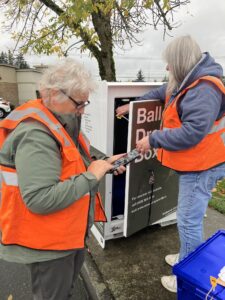
A Snohomish County ballot collection team on the job.
The six-student capstone team created an integrated system called “Collect. Calculate. Dispatch.” that addresses a challenge facing the county: efficiently managing ballot pickups from 35 drop boxes serving more than 533,000 registered voters.
The student-developed solution features three key components:
- A smart scale system that continuously monitors ballot box weight and transmits fullness data in real-time
- A route optimization tool that creates efficient collection paths
- An integrated dashboard that provides live visibility into collection operations. The modular design allows the county to implement the system gradually while maintaining cost-effectiveness.
“I am extremely impressed with the quality of work of our UW capstone team,” Fell said. “The students were organized, collaborative, and motivated. They quickly learned how our ballot collection process works and identified key areas where they could add value. Using sound methodology to rank opportunities and evaluate potential enhancements, they developed quality prototypes that are ready for field testing in future elections. Our team is grateful for the chance to work with such talented students.”
The project, which is still in the piloting phase, has the potential to deliver measurable benefits. According to the capstone team, the optimized routing system saves 122 miles traveled between boxes per general election and costs $1,000 less than purchasing pre-built scales. Beyond the quantitative improvements, the system enhances staff safety through ergonomic design features and provides election officials with unprecedented visibility into collection operations.
 “Snohomish County Elections is currently working with the smart sensor vendor to finalize communication protocols between the smart sensors and the prototype smart scale built by the UW students,” said Matthew Pangburn, Snohomish County Elections Manager. “We hope to have the first smart scale in operation this spring and will determine future deployments based on initial field results.”
“Snohomish County Elections is currently working with the smart sensor vendor to finalize communication protocols between the smart sensors and the prototype smart scale built by the UW students,” said Matthew Pangburn, Snohomish County Elections Manager. “We hope to have the first smart scale in operation this spring and will determine future deployments based on initial field results.”
The capstone team, consisting of Bella Aguirre, Laura Anderegg, Ethan Radford, Josiah Rule, Victoria Tan, and Gabe Theall, spent an academic year working with county officials to understand existing processes, identify improvement opportunities, and develop solutions.
“Not having an elections background, the students brought a fresh perspective in evaluating election processes, identifying pain points, and developing solutions,” Pangburn said. “Their exposure to and experience with technology better informed our staff on potential tools we could be using. They also brought an energy and enthusiasm to the work that was fun to experience.”
electionline Merch
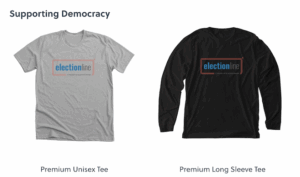 You’ve asked for it, well now you’ve got it! Just in time for all of your holiday gift-giving. We’ve opened up an electionline merch store using Bonfire. Currently we’re offering a couple of different t-shirts, a long-sleeve t-shirt and a hoodie.
You’ve asked for it, well now you’ve got it! Just in time for all of your holiday gift-giving. We’ve opened up an electionline merch store using Bonfire. Currently we’re offering a couple of different t-shirts, a long-sleeve t-shirt and a hoodie.
electionline Daily News Email
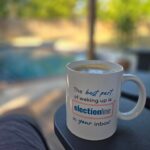 What’s the best part of waking up? electionline Daily News in your inbox of course so be sure to sign up for your daily dose.
What’s the best part of waking up? electionline Daily News in your inbox of course so be sure to sign up for your daily dose.
Each morning you’ll receive the top headlines of the day, plus a listing of states featured in that day’s news round up.
To sign up, simply visit our site and provide us with your email and you’ll begin receiving the news in your inbox each morning.
We Google so you don’t have to!
Election News This Week
 Federal Update: Last week Crooked Media, NBC News and others reported that state-level elections officials had received an invitation from Kellie M. Hardiman election executive with the Federal Bureau of Investigations (FBI) to participate in a call – February 25 – about the upcoming elections. Coming on the heels of the FBI’s investigation into Fulton County, Georgia, some elections officials expressed concerns about the invitation; however, meeting with federal officials about election security is not new and Hardiman spoke at the recent JEOLC conference hosted by the Election Center. An FBI spokesperson said in a statement: “The Election Executive is not a new role. There have been designated executives in previous election cycles to take point on coordinating election related matters and speaking on behalf of the FBI. The FBI has conducted outreach in prior cycles through groups like the National Association of Secretaries of States and participated in threat overview briefs with federal partners.” The call will also include election officials from the Department of Homeland Security, Department of Justice, United States Postal Inspection Service and Election Assistance Commission. In advance of U.S. Attorney General Pam Bondi’s February 11th testimony before Congress, current and former election officials urged Congress to step in and demand answers from the Department of Justice (DOJ) about its sweeping push to collect states’ sensitive voter data. In a letter released this week, a bipartisan group of current and former election officials from Issue One’s Faces of Democracy warned that the DOJ’s campaign to obtain unredacted statewide voter registration data from 40 states is putting voter privacy at risk, undermining states’ constitutional authority, and distracting election offices from preparing for upcoming elections. The election officials emphasize that they “know first hand that free, fair, and secure elections depend on respecting states’ primary authority to run elections, public trust, and the careful protection of voters’ personal information.” The letter urges Congress to hold robust oversight hearings, require transparency from the DOJ, and reaffirm that states — not the executive branch — are preeminent in running elections. “Voter registration systems contain highly sensitive personal information,” the officials write, warning that the DOJ “has provided little explanation for how sensitive information would be stored, protected, or whether it could be shared with other federal agencies.” West Virginia Secretary of State Kris Warner announced the state will not be volunteering personal information of registered voters to the U.S. Department of Justice. Warner submitted a letter to the DOJ this week stating statutes cited by federal officials do not require compliance and state laws protects sensitive information of voters. “West Virginians entrust me with their sensitive personal information. Turning it over to the federal government, which is contrary to State law, will simply not happen,” Warner stated Wednesday. “State law is clear: voter lists are available in a redacted format from my office, but I’ll not be turning over any West Virginian’s protected information.”
Federal Update: Last week Crooked Media, NBC News and others reported that state-level elections officials had received an invitation from Kellie M. Hardiman election executive with the Federal Bureau of Investigations (FBI) to participate in a call – February 25 – about the upcoming elections. Coming on the heels of the FBI’s investigation into Fulton County, Georgia, some elections officials expressed concerns about the invitation; however, meeting with federal officials about election security is not new and Hardiman spoke at the recent JEOLC conference hosted by the Election Center. An FBI spokesperson said in a statement: “The Election Executive is not a new role. There have been designated executives in previous election cycles to take point on coordinating election related matters and speaking on behalf of the FBI. The FBI has conducted outreach in prior cycles through groups like the National Association of Secretaries of States and participated in threat overview briefs with federal partners.” The call will also include election officials from the Department of Homeland Security, Department of Justice, United States Postal Inspection Service and Election Assistance Commission. In advance of U.S. Attorney General Pam Bondi’s February 11th testimony before Congress, current and former election officials urged Congress to step in and demand answers from the Department of Justice (DOJ) about its sweeping push to collect states’ sensitive voter data. In a letter released this week, a bipartisan group of current and former election officials from Issue One’s Faces of Democracy warned that the DOJ’s campaign to obtain unredacted statewide voter registration data from 40 states is putting voter privacy at risk, undermining states’ constitutional authority, and distracting election offices from preparing for upcoming elections. The election officials emphasize that they “know first hand that free, fair, and secure elections depend on respecting states’ primary authority to run elections, public trust, and the careful protection of voters’ personal information.” The letter urges Congress to hold robust oversight hearings, require transparency from the DOJ, and reaffirm that states — not the executive branch — are preeminent in running elections. “Voter registration systems contain highly sensitive personal information,” the officials write, warning that the DOJ “has provided little explanation for how sensitive information would be stored, protected, or whether it could be shared with other federal agencies.” West Virginia Secretary of State Kris Warner announced the state will not be volunteering personal information of registered voters to the U.S. Department of Justice. Warner submitted a letter to the DOJ this week stating statutes cited by federal officials do not require compliance and state laws protects sensitive information of voters. “West Virginians entrust me with their sensitive personal information. Turning it over to the federal government, which is contrary to State law, will simply not happen,” Warner stated Wednesday. “State law is clear: voter lists are available in a redacted format from my office, but I’ll not be turning over any West Virginian’s protected information.”
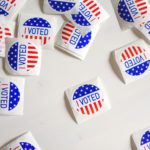 Federal Investigations: This week, under a judge’s order, the affidavit used by the FBI to justify a January raid on Fulton County, Georgia’s election warehouse was released, raising new questions about the investigation. The document, which was under seal until February 10, cited irregularities in the 2020 election that federal authorities claim necessitated the seizure of the documents, though critics say the claims have already been adjudicated or debunked in the six years since the election took place. The 19-page document alleges that Fulton County election officials violated two federal election laws. The FBI claimed that Fulton County “knowingly and willfully deprive(d)” voters of a fair election process by failing to account for discrepancies between separate recounts that resulted in different ballot totals. The document also cited a number of witnesses — whose names were redacted before the affidavit was released — who made allegations of missing ballot images, duplicated ballots and irregularities with tabulator tapes, among other issues. According to the Atlanta Journal-Constitution, no evidence of intentional misconduct was found during previous investigations by the state. FBI agent Hugh Raymond Evans, who authored the affidavit, wrote that the FBI’s “criminal investigation originated from a referral sent by Kurt Olsen, Presidentially appointed Director of Election Security and Integrity.” Olsen is a former Trump campaign lawyer who played a central role in Trump’s attempts to undermine the results of the 2020 election, according to reporting from POLITICO. In Dayton, Ohio on February 2 investigators from the Department of Homeland Security showed up at a career tech high school to investigate allegations of voter fraud. According to district officials, a former student reported feeling coerced to back a particular candidate during a registration drive in 2024. In a statement, Homeland Security officials shed very little light on their visit. A spokesperson said the incident was “part of an ongoing criminal investigation.” “DHS did not conduct any immigration enforcement at this school. There is no threat to public safety,” the spokesperson added. Dayton Public Schools Superintendent David Lawrence said he got a call on the morning of Feb. 2 about federal officials at David Ponitz Career Technical High School. District protocol directs the principal to call his office if any member of homeland security or its subagencies like Immigration and Customs Enforcement show up at a school. Lawrence admitted he was “miffed” that federal agents were ready to start a voter fraud investigation following a single allegation from more than a year ago. But he insisted it won’t change anything about their voter registration program. “It’ll probably be bigger than ever,” he said.
Federal Investigations: This week, under a judge’s order, the affidavit used by the FBI to justify a January raid on Fulton County, Georgia’s election warehouse was released, raising new questions about the investigation. The document, which was under seal until February 10, cited irregularities in the 2020 election that federal authorities claim necessitated the seizure of the documents, though critics say the claims have already been adjudicated or debunked in the six years since the election took place. The 19-page document alleges that Fulton County election officials violated two federal election laws. The FBI claimed that Fulton County “knowingly and willfully deprive(d)” voters of a fair election process by failing to account for discrepancies between separate recounts that resulted in different ballot totals. The document also cited a number of witnesses — whose names were redacted before the affidavit was released — who made allegations of missing ballot images, duplicated ballots and irregularities with tabulator tapes, among other issues. According to the Atlanta Journal-Constitution, no evidence of intentional misconduct was found during previous investigations by the state. FBI agent Hugh Raymond Evans, who authored the affidavit, wrote that the FBI’s “criminal investigation originated from a referral sent by Kurt Olsen, Presidentially appointed Director of Election Security and Integrity.” Olsen is a former Trump campaign lawyer who played a central role in Trump’s attempts to undermine the results of the 2020 election, according to reporting from POLITICO. In Dayton, Ohio on February 2 investigators from the Department of Homeland Security showed up at a career tech high school to investigate allegations of voter fraud. According to district officials, a former student reported feeling coerced to back a particular candidate during a registration drive in 2024. In a statement, Homeland Security officials shed very little light on their visit. A spokesperson said the incident was “part of an ongoing criminal investigation.” “DHS did not conduct any immigration enforcement at this school. There is no threat to public safety,” the spokesperson added. Dayton Public Schools Superintendent David Lawrence said he got a call on the morning of Feb. 2 about federal officials at David Ponitz Career Technical High School. District protocol directs the principal to call his office if any member of homeland security or its subagencies like Immigration and Customs Enforcement show up at a school. Lawrence admitted he was “miffed” that federal agents were ready to start a voter fraud investigation following a single allegation from more than a year ago. But he insisted it won’t change anything about their voter registration program. “It’ll probably be bigger than ever,” he said.
 Election Day Threats: The Benton County, Washington Election Center stopped counting ballots and closed down for about a half day on Tuesday after discovering a suspicious envelope. Election officials told the Tri-City Herald they were able to reopen about 3:30 p.m. and remained open until 8 p.m. for voters to submit their ballots and update their registration. “We always have the safety and security of our team at the forefront, and try to balance that with making sure we get the ballots processed timely and the results processed timely and accurately,” Benton County Auditor Brenda Chilton told the Herald. Investigators with the Benton County Sheriff’s Office asked her office to be careful about releasing details about the unusual ballot envelope while they investigate the incident. The election team found the unusual envelope about 11 a.m. and immediately closed the facility out of an abundance of caution, she said. The envelope was part of a batch of ballots picked up by workers Tuesday morning from their Richland Post Office box. “Our staff recognized it as unusual,” Chilton said. “It did not arrive in the format you would normally expect a ballot envelope to come in.” Election workers began their safety protocols, and notified security personnel at the county and at the Washington Secretary of State’s Office. Chilton said an election administrator isolated the envelope in a plastic bag and handled it with gloves. The sheriff’s office has since taken possession of it. This incident didn’t impact the timely and accurate counting of ballots on Election Day, Chilton said with results being posted not long after 8pm.
Election Day Threats: The Benton County, Washington Election Center stopped counting ballots and closed down for about a half day on Tuesday after discovering a suspicious envelope. Election officials told the Tri-City Herald they were able to reopen about 3:30 p.m. and remained open until 8 p.m. for voters to submit their ballots and update their registration. “We always have the safety and security of our team at the forefront, and try to balance that with making sure we get the ballots processed timely and the results processed timely and accurately,” Benton County Auditor Brenda Chilton told the Herald. Investigators with the Benton County Sheriff’s Office asked her office to be careful about releasing details about the unusual ballot envelope while they investigate the incident. The election team found the unusual envelope about 11 a.m. and immediately closed the facility out of an abundance of caution, she said. The envelope was part of a batch of ballots picked up by workers Tuesday morning from their Richland Post Office box. “Our staff recognized it as unusual,” Chilton said. “It did not arrive in the format you would normally expect a ballot envelope to come in.” Election workers began their safety protocols, and notified security personnel at the county and at the Washington Secretary of State’s Office. Chilton said an election administrator isolated the envelope in a plastic bag and handled it with gloves. The sheriff’s office has since taken possession of it. This incident didn’t impact the timely and accurate counting of ballots on Election Day, Chilton said with results being posted not long after 8pm.
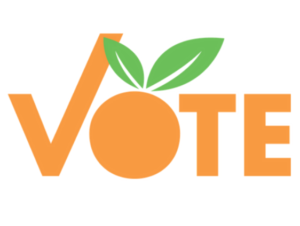 Youth Vote: Orange County, Florida Supervisor of Elections Karen Castor Dentel this week announced the launch of the agency’s “College Tour,” which will bring elections staff to college campuses to register students to vote, update their voter information, explain various voting options, and encourage them to sign up to be poll workers during the upcoming midterm elections. The College Tour comes as students navigate often-changing voting rules that election officials say can be confusing. “I think a lot of young voters struggle with the first-time voting, and if they’re in college or away from home, sometimes the process isn’t as obvious,” Castor Dentel told VoxPopuli in a phone interview. “So we’re trying, in our College Tour, to help the students understand the process and the options they have to make sure their voice and their vote counts.” A former educator and Orange County School Board Member, Castor Dentel has made youth voting a primary focus of her first term in office. The tour has already visited Rollins College, Keiser University, and Full Sail University, Valencia College and the University of Central Florida.
Youth Vote: Orange County, Florida Supervisor of Elections Karen Castor Dentel this week announced the launch of the agency’s “College Tour,” which will bring elections staff to college campuses to register students to vote, update their voter information, explain various voting options, and encourage them to sign up to be poll workers during the upcoming midterm elections. The College Tour comes as students navigate often-changing voting rules that election officials say can be confusing. “I think a lot of young voters struggle with the first-time voting, and if they’re in college or away from home, sometimes the process isn’t as obvious,” Castor Dentel told VoxPopuli in a phone interview. “So we’re trying, in our College Tour, to help the students understand the process and the options they have to make sure their voice and their vote counts.” A former educator and Orange County School Board Member, Castor Dentel has made youth voting a primary focus of her first term in office. The tour has already visited Rollins College, Keiser University, and Full Sail University, Valencia College and the University of Central Florida.
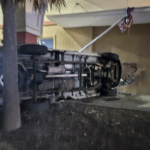 Not Just Election Day: Followers of electionline know that we’ve long tracked the phenomena of cars crashing into polling places on Election Day. But this week in Clay County, Florida, it wasn’t a polling place on Election
Not Just Election Day: Followers of electionline know that we’ve long tracked the phenomena of cars crashing into polling places on Election Day. But this week in Clay County, Florida, it wasn’t a polling place on Election  Day, it was the supervisor of elections office on a Friday morning. According to Clay Today, Supervisor of Elections Chris Chambless said a man lost control of his vehicle after hitting a curb while driving northbound at a high rate of speed on Orange Avenue, then flipping and hitting the elections office shortly after 5:40 a.m. While the vehicle didn’t go into the office, it punched a hole into the wall and knocked materials off the wall and furniture around. “Thankfully, nobody was hurt,” Chambless told the paper. “It decimated a workstation. If somebody was sitting there, that would have been terrible.” The Green Cove Springs Police Department responded to the accident. As of Tuesday afternoon, the accident report had not been completed. Chambless said the driver hit a curb and over-corrected, then hit the median, over-corrected again and flipped into the building. He climbed from the vehicle and walked to the Dunkin’ and asked workers if they’d help him find his truck.
Day, it was the supervisor of elections office on a Friday morning. According to Clay Today, Supervisor of Elections Chris Chambless said a man lost control of his vehicle after hitting a curb while driving northbound at a high rate of speed on Orange Avenue, then flipping and hitting the elections office shortly after 5:40 a.m. While the vehicle didn’t go into the office, it punched a hole into the wall and knocked materials off the wall and furniture around. “Thankfully, nobody was hurt,” Chambless told the paper. “It decimated a workstation. If somebody was sitting there, that would have been terrible.” The Green Cove Springs Police Department responded to the accident. As of Tuesday afternoon, the accident report had not been completed. Chambless said the driver hit a curb and over-corrected, then hit the median, over-corrected again and flipped into the building. He climbed from the vehicle and walked to the Dunkin’ and asked workers if they’d help him find his truck.
Personnel News: San Luis Obispo County Clerk-Recorder Elaina Cano has announced she will seek re-election. Janet Rowe is retiring after 27 years as the Lynn, Massachusetts clerk. Jason Oliver has begun his service as the new Dade County, Georgia supervisor of elections.
New Research and Resources
 Vote By Mail: Since the 2024 election, four states — all Republican-controlled — have changed their election laws so that they no longer accept mail ballots that arrive after Election Day. And while 14 states and Washington, D.C., still do so as long as those ballots are postmarked by Election Day, more of those ballots could be rejected in future elections due to recent changes to U.S. Postal Service procedures. To top it all off, a pending U.S. Supreme Court case could make it illegal for any jurisdiction to count ballots that arrive after Election Day, period. Taken together, these changes have the potential to impact, and even disenfranchise, thousands of voters. At the same time, the share of voters whose ballots may be affected constitute only a small fraction of the overall electorate, according to a Votebeat review of data on mail ballots arriving after Election Day. Votebeat contacted the 19 jurisdictions where voters in the 2024 general election could return their ballots after Election Day and still have them counted. Across the 13 that provided information, more than 750,000 ballots were received after Election Day, representing 0.1-3.1% of the total turnout in those states.
Vote By Mail: Since the 2024 election, four states — all Republican-controlled — have changed their election laws so that they no longer accept mail ballots that arrive after Election Day. And while 14 states and Washington, D.C., still do so as long as those ballots are postmarked by Election Day, more of those ballots could be rejected in future elections due to recent changes to U.S. Postal Service procedures. To top it all off, a pending U.S. Supreme Court case could make it illegal for any jurisdiction to count ballots that arrive after Election Day, period. Taken together, these changes have the potential to impact, and even disenfranchise, thousands of voters. At the same time, the share of voters whose ballots may be affected constitute only a small fraction of the overall electorate, according to a Votebeat review of data on mail ballots arriving after Election Day. Votebeat contacted the 19 jurisdictions where voters in the 2024 general election could return their ballots after Election Day and still have them counted. Across the 13 that provided information, more than 750,000 ballots were received after Election Day, representing 0.1-3.1% of the total turnout in those states.
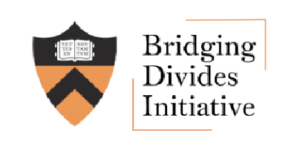 Political Violence: The past year saw a dangerous escalation in the political violence risk environment in the U.S., from high-profile assassinations to aggressive federal immigration operations. Threats and harassment spiked, and leading community safety practitioners reported that the demand for de-escalation support surged to new heights. Already in 2026, the risk landscape has continued to intensify with the fatal shootings of Renee Nicole Good and Alex Pretti by federal agents in Minnesota, the Trump administration’s consideration of invoking the Insurrection Act, and the FBI raid of a Georgia election facility ahead of the midterms. Identifying shifts in this landscape over the course of 2025 — and lessons learned from the resilience strategies employed by local officials, civil society organizations, and community leaders to push back — will be critical for efforts to counter new and persistent threats. Drawing on data collection and real-time monitoring conducted by Bridging Divides Iniative and our partners over the last year, this special report, Key Political Violence and Resilience Trends From 2025; With Developments to Watch in 2026, identifies 5 key political violence trends that emerged in 2025, evaluates how these risk factors will evolve in 2026, and elevates 3 models of effective preparation and response that can inform mitigation work in the coming months.
Political Violence: The past year saw a dangerous escalation in the political violence risk environment in the U.S., from high-profile assassinations to aggressive federal immigration operations. Threats and harassment spiked, and leading community safety practitioners reported that the demand for de-escalation support surged to new heights. Already in 2026, the risk landscape has continued to intensify with the fatal shootings of Renee Nicole Good and Alex Pretti by federal agents in Minnesota, the Trump administration’s consideration of invoking the Insurrection Act, and the FBI raid of a Georgia election facility ahead of the midterms. Identifying shifts in this landscape over the course of 2025 — and lessons learned from the resilience strategies employed by local officials, civil society organizations, and community leaders to push back — will be critical for efforts to counter new and persistent threats. Drawing on data collection and real-time monitoring conducted by Bridging Divides Iniative and our partners over the last year, this special report, Key Political Violence and Resilience Trends From 2025; With Developments to Watch in 2026, identifies 5 key political violence trends that emerged in 2025, evaluates how these risk factors will evolve in 2026, and elevates 3 models of effective preparation and response that can inform mitigation work in the coming months.
Ballot Measures, Legislation & Rulemaking
 Federal Legislation: By a 218-213 vote, the House approved the Safeguard American Voter Eligibility, or SAVE America Act on February 11. The bill would require Americans to prove they are citizens when they register to vote, mostly through a valid U.S. passport or birth certificate. It would also require a valid photo identification before voters can cast ballots, which some states already demand. Republicans said the legislation is needed to prevent voter fraud, but Democrats warn it will disenfranchise millions of Americans by making it harder to vote. Federal law already requires that voters in national elections be U.S. citizens, but there’s no requirement to provide documentary proof. Experts said voter fraud is extremely rare, and very few noncitizens ever slip through the cracks. Fewer than one in 10 Americans don’t have paperwork proving they are citizens. The legislation is actually a do-over of a similar bill the House approved last year, which also sought to clamp down on fraudulent voting, particularly among noncitizens. It won the support of four House Democrats, but stalled in the Republican-led Senate. Only one Democrat, Rep. Henry Cuellar of Texas, voted for the revised bill. This version toughens some of the requirements further, while creating a process for those whose names may have changed, particularly during marriage, to provide the paperwork necessary and further attest to their identity. It also requires states to share their voter information with the Department of Homeland Security, as a way to verify the citizenship of the names on the voter rolls. That has drawn pushback from elections officials as potentially intrusive on people’s privacy. The new rules in the bill would take effect immediately, if the bill is passed by both chambers of Congress and signed into law. But with primary elections getting underway next month, critics said the sudden shift would be difficult for state election officials to implement and potentially confuse voters. Voting experts have warned that more than 20 million U.S. citizens of voting age do not have proof of their citizenship readily available. Almost half of Americans do not have a U.S. passport. In the Senate, where Republicans also have majority control, there does not appear to be enough support to push the bill past the chamber’s filibuster rules, which largely require 60 votes to advance legislation.
Federal Legislation: By a 218-213 vote, the House approved the Safeguard American Voter Eligibility, or SAVE America Act on February 11. The bill would require Americans to prove they are citizens when they register to vote, mostly through a valid U.S. passport or birth certificate. It would also require a valid photo identification before voters can cast ballots, which some states already demand. Republicans said the legislation is needed to prevent voter fraud, but Democrats warn it will disenfranchise millions of Americans by making it harder to vote. Federal law already requires that voters in national elections be U.S. citizens, but there’s no requirement to provide documentary proof. Experts said voter fraud is extremely rare, and very few noncitizens ever slip through the cracks. Fewer than one in 10 Americans don’t have paperwork proving they are citizens. The legislation is actually a do-over of a similar bill the House approved last year, which also sought to clamp down on fraudulent voting, particularly among noncitizens. It won the support of four House Democrats, but stalled in the Republican-led Senate. Only one Democrat, Rep. Henry Cuellar of Texas, voted for the revised bill. This version toughens some of the requirements further, while creating a process for those whose names may have changed, particularly during marriage, to provide the paperwork necessary and further attest to their identity. It also requires states to share their voter information with the Department of Homeland Security, as a way to verify the citizenship of the names on the voter rolls. That has drawn pushback from elections officials as potentially intrusive on people’s privacy. The new rules in the bill would take effect immediately, if the bill is passed by both chambers of Congress and signed into law. But with primary elections getting underway next month, critics said the sudden shift would be difficult for state election officials to implement and potentially confuse voters. Voting experts have warned that more than 20 million U.S. citizens of voting age do not have proof of their citizenship readily available. Almost half of Americans do not have a U.S. passport. In the Senate, where Republicans also have majority control, there does not appear to be enough support to push the bill past the chamber’s filibuster rules, which largely require 60 votes to advance legislation.
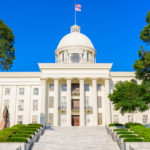 Alabama: If some lawmakers get their way, Alabamians could avoid long lines at the polls on election day by casting their votes early. House Bill 270 establishes a process for early in-person voting at centers across the state. This bill would require each county commission to establish early voting center locations in the county and establish a communications plan to publish notice of early voting in the respective county. House Bill 45 would allow a designated person to deliver a disabled voter’s absentee ballot application and ballot to the absentee election manager. Members of the Alabama House Democratic Caucus say it’s time to make changes with these. Secretary of State Wes Allen has been very adamant about upholding election integrity and has said he believes in election day, not election month. One sponsor of House Bill 270, Representative Adline Clarke, says that the voter participation rate in the 2022 midterms was 38.5 percent, the lowest rate in 30 years, prompting some lawmakers to push for improved access to voting. Clarke said, “Some people aren’t able to go to the polls on a specific Tuesday, or they may deal with employment, financial, or transportation issues that keep them at home on that one particular day to vote. There’s no reason we can’t give more people more time and more opportunity to exercise their most fundamental right as a citizen.”
Alabama: If some lawmakers get their way, Alabamians could avoid long lines at the polls on election day by casting their votes early. House Bill 270 establishes a process for early in-person voting at centers across the state. This bill would require each county commission to establish early voting center locations in the county and establish a communications plan to publish notice of early voting in the respective county. House Bill 45 would allow a designated person to deliver a disabled voter’s absentee ballot application and ballot to the absentee election manager. Members of the Alabama House Democratic Caucus say it’s time to make changes with these. Secretary of State Wes Allen has been very adamant about upholding election integrity and has said he believes in election day, not election month. One sponsor of House Bill 270, Representative Adline Clarke, says that the voter participation rate in the 2022 midterms was 38.5 percent, the lowest rate in 30 years, prompting some lawmakers to push for improved access to voting. Clarke said, “Some people aren’t able to go to the polls on a specific Tuesday, or they may deal with employment, financial, or transportation issues that keep them at home on that one particular day to vote. There’s no reason we can’t give more people more time and more opportunity to exercise their most fundamental right as a citizen.”
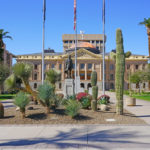 Arizona: Gov. Katie Hobbs (D) signed a new law permanently moving Arizona’s primary elections up from August to the second-to-last Tuesday in July. That means this year’s new primary election date is July 21. The change was needed to give election officials enough time to meet federally imposed deadlines and make sure overseas military members can vote. The Legislature had to make a similar change last year after Congress made changes to several election deadlines that conflicted with Arizona’s existing dates and threatened to put ballots for military personnel and the state’s presidential votes at risk. The new law will also move up the voter registration cut-off date for the primary to June 22 and affect other key election dates, including the candidate filing deadline. In addition to changing the voter registration deadline, Kolodin’s bill also clarified that political party observers can oversee activities anywhere voting occurs. It also allows voters more time to address signature issues on early ballots.
Arizona: Gov. Katie Hobbs (D) signed a new law permanently moving Arizona’s primary elections up from August to the second-to-last Tuesday in July. That means this year’s new primary election date is July 21. The change was needed to give election officials enough time to meet federally imposed deadlines and make sure overseas military members can vote. The Legislature had to make a similar change last year after Congress made changes to several election deadlines that conflicted with Arizona’s existing dates and threatened to put ballots for military personnel and the state’s presidential votes at risk. The new law will also move up the voter registration cut-off date for the primary to June 22 and affect other key election dates, including the candidate filing deadline. In addition to changing the voter registration deadline, Kolodin’s bill also clarified that political party observers can oversee activities anywhere voting occurs. It also allows voters more time to address signature issues on early ballots.
The House voted along party lines to pass House Concurrent Resolution 2001, which would make it much harder to vote by mail in the Grand Canyon State. A major provision of HCR2001 would amend the Arizona Constitution to end what election officials call “late earlies” — mail-in ballots dropped off at polling locations on Election Day and the weekend prior. The 200,000 late early ballots dropped off at polling places and drop boxes on Election Day during the past couple of elections slow down the reporting of results because workers have to process them and verify voter signatures before they can be tabulated. (Ballots received prior to Election Day have their signatures verified, and then are tabulated immediately when the polls close, allowing the bulk of them to be reported an hour later, when results can begin to be released.) A provision in HCR2001 would require all voters to provide a government-issued ID concurrently with casting their ballot. Arizonans who vote in person at a polling site already must show identification before they are given a ballot, but early voters aren’t required to do so because their signatures are verified by elections workers. The resolution contains no rules or guidelines for how voters would provide state-issued ID with their mail-in ballots, which currently undergo signature verification to confirm a voter’s identity.
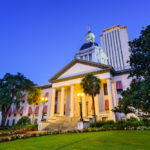 Florida: A sweeping election proposal from Fort Myers Republican Rep. Jenna Persons-Mulicka has advanced through its first House Committee in the face of sharp Democratic criticism. The bill (HB 991) would require verification of U.S. citizenship before voters can cast a regular ballot, mandate statewide rechecks of existing voter rolls and overhaul how Florida audits election results. The measure cleared the Government Operations Subcommittee after lawmakers rejected a Democratic strike-all amendment that would have expanded voter access through same-day registration, automatic registration and an Election Day holiday. If approved, HB 991 would require citizenship verification at the time of voter registration and during certain registration updates. Applicants whose citizenship cannot be confirmed through Department of Highway Safety and Motor Vehicles (DHSMV) records would be designated as unverified voters and barred from casting a regular ballot. Those voters could still vote provisionally, but their ballots would only be counted if citizenship is verified within two days after the election. Supervisors of Elections would remain the final authority on voter eligibility, with voters receiving notice, time to respond and the opportunity to request a hearing if questions arise. Persons-Mulicka emphasized that Supervisors would review citizenship documents but would not collect or retain copies of sensitive personal records. The bill also expands mandatory data sharing between DHSMV and the Department of State, requiring weekly transmission of citizenship and identification information to support voter list maintenance. Florida driver’s licenses and state identification cards would indicate whether the holder is a U.S. citizen beginning July 2027, a change supporters say would streamline verification for voters with state-issued IDs. Beyond voter eligibility, the measure would make broad changes to election administration. It would require most voting to be conducted on paper ballots unless a voter with a disability requests an accessible voting device. It would also establish an automated, independent vote-validation process to review ballots before results are certified.
Florida: A sweeping election proposal from Fort Myers Republican Rep. Jenna Persons-Mulicka has advanced through its first House Committee in the face of sharp Democratic criticism. The bill (HB 991) would require verification of U.S. citizenship before voters can cast a regular ballot, mandate statewide rechecks of existing voter rolls and overhaul how Florida audits election results. The measure cleared the Government Operations Subcommittee after lawmakers rejected a Democratic strike-all amendment that would have expanded voter access through same-day registration, automatic registration and an Election Day holiday. If approved, HB 991 would require citizenship verification at the time of voter registration and during certain registration updates. Applicants whose citizenship cannot be confirmed through Department of Highway Safety and Motor Vehicles (DHSMV) records would be designated as unverified voters and barred from casting a regular ballot. Those voters could still vote provisionally, but their ballots would only be counted if citizenship is verified within two days after the election. Supervisors of Elections would remain the final authority on voter eligibility, with voters receiving notice, time to respond and the opportunity to request a hearing if questions arise. Persons-Mulicka emphasized that Supervisors would review citizenship documents but would not collect or retain copies of sensitive personal records. The bill also expands mandatory data sharing between DHSMV and the Department of State, requiring weekly transmission of citizenship and identification information to support voter list maintenance. Florida driver’s licenses and state identification cards would indicate whether the holder is a U.S. citizen beginning July 2027, a change supporters say would streamline verification for voters with state-issued IDs. Beyond voter eligibility, the measure would make broad changes to election administration. It would require most voting to be conducted on paper ballots unless a voter with a disability requests an accessible voting device. It would also establish an automated, independent vote-validation process to review ballots before results are certified.
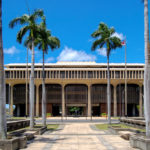 Hawai’i: A state proposal could automatically register eligible residents to vote in elections — unless they explicitly “opt out” of that opportunity. Hawaiʻi already has an automatic voter registration system, but it follows an “opt-in” model. Eligible residents have to choose registration when they apply for or renew their driver’s license or state ID. House Bill 2132 would instead register voters unless they decline. The measure said unregistered voters would be mailed notices that allow them to opt out. According to the measure, the current model “places the burden of registration on individual voters,” and an opt-out model makes voting easier. It said that “every eligible person should be able to register to vote in a convenient and secure manner that benefits both new voters and election administrators. Improving voter registration processes can help ensure state election systems remain secure and efficient, safeguard the integrity of votes, and reduce administrative costs.”
Hawai’i: A state proposal could automatically register eligible residents to vote in elections — unless they explicitly “opt out” of that opportunity. Hawaiʻi already has an automatic voter registration system, but it follows an “opt-in” model. Eligible residents have to choose registration when they apply for or renew their driver’s license or state ID. House Bill 2132 would instead register voters unless they decline. The measure said unregistered voters would be mailed notices that allow them to opt out. According to the measure, the current model “places the burden of registration on individual voters,” and an opt-out model makes voting easier. It said that “every eligible person should be able to register to vote in a convenient and secure manner that benefits both new voters and election administrators. Improving voter registration processes can help ensure state election systems remain secure and efficient, safeguard the integrity of votes, and reduce administrative costs.”
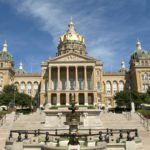 Iowa: Iowa’s secretary of state is proposing that candidates in Iowa school board and city elections file the petitions to get their names printed on ballots with their county auditor. School board secretaries and city clerks have been handling that paperwork for years. However, at least 34 local candidates were left off ballots this past November after city clerks and school board secretaries in seven counties missed the deadline for submitting the petitions to county auditors. The bill also clarifies when recounts are permitted in bond elections that require 60%. Cerro Gordo County Auditor Adam Wedmore, president of the Iowa State Association of County Auditors — which backs the bill, testified at Wednesday’s subcommittee hearing on the bill. “It’s making some timely tweaks to current election law,” Wedmore said. “It does clean up some of the things that we have found over the last few elections.” The bill would give county auditors authority to decide when to convene the boards that count absentee ballots on election day. Under current law, those boards are required to begin at 9 a.m. That would continue for statewide and federal elections, but officials say in low-turn-out elections for bonding issues or city and school board elections, it doesn’t take that much time to count absentee ballots.
Iowa: Iowa’s secretary of state is proposing that candidates in Iowa school board and city elections file the petitions to get their names printed on ballots with their county auditor. School board secretaries and city clerks have been handling that paperwork for years. However, at least 34 local candidates were left off ballots this past November after city clerks and school board secretaries in seven counties missed the deadline for submitting the petitions to county auditors. The bill also clarifies when recounts are permitted in bond elections that require 60%. Cerro Gordo County Auditor Adam Wedmore, president of the Iowa State Association of County Auditors — which backs the bill, testified at Wednesday’s subcommittee hearing on the bill. “It’s making some timely tweaks to current election law,” Wedmore said. “It does clean up some of the things that we have found over the last few elections.” The bill would give county auditors authority to decide when to convene the boards that count absentee ballots on election day. Under current law, those boards are required to begin at 9 a.m. That would continue for statewide and federal elections, but officials say in low-turn-out elections for bonding issues or city and school board elections, it doesn’t take that much time to count absentee ballots.
 Kansas: The Kansas Secretary of State’s Office wants to block voting rights groups from “forum shopping” legal challenges to election laws by requiring such cases to be filed in Shawnee County District Court, a forum that is often favorable to Republicans. Voting rights groups in the past five years have filed two lawsuits over election laws in state court, one in 2021 in Shawnee County and one in 2025 in Douglas County. Both are ongoing. Other cases have been filed in federal court. Clay Barker, general counsel for the secretary of state, said the idea to set Shawnee County as the venue for election lawsuits was suggested by litigation attorneys retained by Attorney General Kris Kobach. “We want to ensure that there isn’t what’s known amongst lawyers as forum shopping, which is something every competent litigation lawyer does,” Barker said. “You try to find the best venue, the best district court, for the particular case you’re bringing.” Under HB 2569, the lawsuit filed last year over a change in law to eliminate the three-day grace period for mail-in ballots would be moved from Douglas to Shawnee County. Democrats on the House Elections Committee accused Barker of trying to cherry-pick the best forum for defending election laws. They noted the burden that would be placed on a plaintiff from, for example, Colby, a five-hour drive from Topeka. Barker said the plaintiff wouldn’t have to appear in court. “Has there ever been an instance where a plaintiff wanted to be in the courtroom while their case is being heard? Have you witnessed that before?” said Brooklynne Mosley, a Lawrence Democrat.
Kansas: The Kansas Secretary of State’s Office wants to block voting rights groups from “forum shopping” legal challenges to election laws by requiring such cases to be filed in Shawnee County District Court, a forum that is often favorable to Republicans. Voting rights groups in the past five years have filed two lawsuits over election laws in state court, one in 2021 in Shawnee County and one in 2025 in Douglas County. Both are ongoing. Other cases have been filed in federal court. Clay Barker, general counsel for the secretary of state, said the idea to set Shawnee County as the venue for election lawsuits was suggested by litigation attorneys retained by Attorney General Kris Kobach. “We want to ensure that there isn’t what’s known amongst lawyers as forum shopping, which is something every competent litigation lawyer does,” Barker said. “You try to find the best venue, the best district court, for the particular case you’re bringing.” Under HB 2569, the lawsuit filed last year over a change in law to eliminate the three-day grace period for mail-in ballots would be moved from Douglas to Shawnee County. Democrats on the House Elections Committee accused Barker of trying to cherry-pick the best forum for defending election laws. They noted the burden that would be placed on a plaintiff from, for example, Colby, a five-hour drive from Topeka. Barker said the plaintiff wouldn’t have to appear in court. “Has there ever been an instance where a plaintiff wanted to be in the courtroom while their case is being heard? Have you witnessed that before?” said Brooklynne Mosley, a Lawrence Democrat.
 Maine: Lawmakers are asking the state’s highest court whether it would be legal to expand ranked-choice voting. The majority of legislators in the Democratically-controlled Maine House of Representatives and Senate voted this week in support of LD 1666, which would expand the voting method to special and general elections for governor, state senator or state representative. The legislation passed both chambers last session but was recalled from the governor’s desk and carried over to this year. During a Jan. 30 work session, sponsor Sen. Cameron Reny (D-Lincoln) explained that the governor had intended to veto the bill, but was open to a solemn occasion — a rarely used action in which lawmakers can ask the Maine Supreme Judicial Court to produce a nonbinding decision on the legality of pending legislation. Following initial passage of the legislation, Reny introduced a joint order asking the justices to issue an advisory opinion on whether the changes made in LD 1666 conform with the provisions of the Constitution of Maine. Speaking on the Senate floor, Reny said the motion “isn’t about whether I agree or disagree with ranked-choice voting…It’s about ensuring Maine law embodies the will of the voters and the text of our Constitution.” The bill will remain in possession of the Senate while it awaits that opinion, which lawmakers will consider before deciding whether to advance the legislation to the governor. But, even if the courts deem it legally possible, it remains unclear how such a change would be implemented in time for the November election.
Maine: Lawmakers are asking the state’s highest court whether it would be legal to expand ranked-choice voting. The majority of legislators in the Democratically-controlled Maine House of Representatives and Senate voted this week in support of LD 1666, which would expand the voting method to special and general elections for governor, state senator or state representative. The legislation passed both chambers last session but was recalled from the governor’s desk and carried over to this year. During a Jan. 30 work session, sponsor Sen. Cameron Reny (D-Lincoln) explained that the governor had intended to veto the bill, but was open to a solemn occasion — a rarely used action in which lawmakers can ask the Maine Supreme Judicial Court to produce a nonbinding decision on the legality of pending legislation. Following initial passage of the legislation, Reny introduced a joint order asking the justices to issue an advisory opinion on whether the changes made in LD 1666 conform with the provisions of the Constitution of Maine. Speaking on the Senate floor, Reny said the motion “isn’t about whether I agree or disagree with ranked-choice voting…It’s about ensuring Maine law embodies the will of the voters and the text of our Constitution.” The bill will remain in possession of the Senate while it awaits that opinion, which lawmakers will consider before deciding whether to advance the legislation to the governor. But, even if the courts deem it legally possible, it remains unclear how such a change would be implemented in time for the November election.
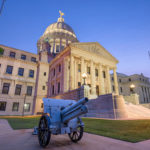 Mississippi: The Senate Elections Committee adopted a measure that would, at least partially, restore the system to allow Mississippians to bypass the Legislature and put issues to a statewide vote. The committee voted to approve Senate Concurrent Resolution 518, which would require initiative organizers to gather signatures from at least 10% of registered voters in the state, or roughly 170,000 signatures, before it can go on a ballot. The committee’s chairman, Republican Sen. Jeremy England of Vancleave, said the measure is a work in progress, but he wanted to advance the bill ahead of Tuesday’s key legislative deadline for the Senate to continue debating the measure. The Mississippi Supreme Court invalidated the state’s initiative process in 2021 over technicalities, and the Legislature has not been able to reach a consensus on how to restore it to voters ever since. “When we have something and get it taken away from us, we want it back,” England said. As it’s currently written, England’s resolution would allow a ballot initiative to change or create state law, but not the state Constitution, as the previous ballot initiative system provided. It would also prohibit initiatives related to abortion and the state’s public pension system.
Mississippi: The Senate Elections Committee adopted a measure that would, at least partially, restore the system to allow Mississippians to bypass the Legislature and put issues to a statewide vote. The committee voted to approve Senate Concurrent Resolution 518, which would require initiative organizers to gather signatures from at least 10% of registered voters in the state, or roughly 170,000 signatures, before it can go on a ballot. The committee’s chairman, Republican Sen. Jeremy England of Vancleave, said the measure is a work in progress, but he wanted to advance the bill ahead of Tuesday’s key legislative deadline for the Senate to continue debating the measure. The Mississippi Supreme Court invalidated the state’s initiative process in 2021 over technicalities, and the Legislature has not been able to reach a consensus on how to restore it to voters ever since. “When we have something and get it taken away from us, we want it back,” England said. As it’s currently written, England’s resolution would allow a ballot initiative to change or create state law, but not the state Constitution, as the previous ballot initiative system provided. It would also prohibit initiatives related to abortion and the state’s public pension system.
The House passed a bill that could make it more onerous for people without a driver’s license to register to vote, a proposal its author said would allow local elections officials to verify a person’s citizenship. The Safeguard Honest Integrity in Elections for Lasting Democracy, or SHIELD, Act would require county registrars to conduct extra checks on people who try to register to vote without a driver’s license number. Under the bill, if someone tried to register and could not produce a license number, the clerk would need to verify whether the person appears in a U.S. Citizenship and Immigration Services database called SAVE. Government agencies use the federal database to verify an applicant’s immigration status or citizenship. The bill would also require election officials to notify applicants flagged as non-citizens and require them to prove citizenship.
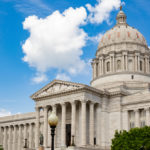 Missouri: Republicans are taking a second shot at passing legislation that gives the secretary of state greater authority over ballot summaries and limits how much a court can intervene. The legislation would give the secretary of state three chances to rewrite challenged proposed ballot language that courts deem insufficient. After those three chances, the courts can rewrite the language themselves. The bill requires challenges for all measures, except initiative petitions, to be brought to Cole County Circuit Court no later than the 22nd Tuesday prior to the election when it will be presented to voters. If the court deems the language unfair, then the secretary of state would have those three chances to change the language. The court can give suggestions, but the secretary will be responsible for the new summary, unless the chances have expired. The bill moves up the date when all actions challenging ballot titles for statewide ballot measures should be completed from 56 days prior to the election when the issue will be on the ballot to 70 days. The legislation also expands the ballot summary limit for measures proposed by the General Assembly from 50 to 100 words. Current state law gives that ability to the courts during litigation. Lawmakers successfully passed a nearly identical law last year with Senate Bill 22. However, it included an additional provision allowing the attorney general to appeal preliminary injunctions against state laws or constitutional provisions. The Missouri Supreme Court cited that additional provision as the reason the court struck down the entirety of the law, saying it “is not germane with the original title and contents of Senate Bill 22.”
Missouri: Republicans are taking a second shot at passing legislation that gives the secretary of state greater authority over ballot summaries and limits how much a court can intervene. The legislation would give the secretary of state three chances to rewrite challenged proposed ballot language that courts deem insufficient. After those three chances, the courts can rewrite the language themselves. The bill requires challenges for all measures, except initiative petitions, to be brought to Cole County Circuit Court no later than the 22nd Tuesday prior to the election when it will be presented to voters. If the court deems the language unfair, then the secretary of state would have those three chances to change the language. The court can give suggestions, but the secretary will be responsible for the new summary, unless the chances have expired. The bill moves up the date when all actions challenging ballot titles for statewide ballot measures should be completed from 56 days prior to the election when the issue will be on the ballot to 70 days. The legislation also expands the ballot summary limit for measures proposed by the General Assembly from 50 to 100 words. Current state law gives that ability to the courts during litigation. Lawmakers successfully passed a nearly identical law last year with Senate Bill 22. However, it included an additional provision allowing the attorney general to appeal preliminary injunctions against state laws or constitutional provisions. The Missouri Supreme Court cited that additional provision as the reason the court struck down the entirety of the law, saying it “is not germane with the original title and contents of Senate Bill 22.”
A bill that’d increase the eligible voting population in Missouri passed through the state’s House with bi-partisan support and now goes on to the state-senate. If approved, the bill would restore voting rights for people currently on probation or parole. The advancing House Bill looks to remove some restrictive language from a state statute that began to include “probation and parole” as temporary disqualifiers in 1993. Missouri has denied the right to vote, suffrage, for various crimes since the state’s first constitution in 1820 was written. “The general assembly shall have the power to exclude from every office of honor, trust, or profit, within this state, and from the right of suffrage, all persons convicted of bribery, perjury, or other infamous crime,” per Article III, Section 14 of the first Missouri Constitution.
 New Mexico: In the wake of President Donald Trump’s recent call to “nationalize” elections, New Mexico could move to set new guardrails against possible federal interference at polling places. A bill filed by Sen. Katy Duhigg, D-Albuquerque, would make it a state-level crime to deploy troops to a polling place or bar registered voters from casting a ballot. Duhigg, a former Albuquerque city clerk, said the bill, Senate Bill 264, would authorize state law enforcement officials to take action under such situations. It would also allow affected voters or state officials to ask a judge to intervene. She said in an interview the bill was prompted by concerns over Trump’s recent remarks. “Best-case scenario, these are laws that are put on the books and never used,” Duhigg said. “But under the worst-case scenario, we need to have them available to us.” The bill intended to gird the state against possible federal interference has already received necessary approval from Gov. Michelle Lujan Grisham to be considered during the 30-day legislative session that ends Feb. 19. Specifically, the measure would make it a misdemeanor offense to order troops to polling places, impinge on state election laws or interfere with the ability of state election officials or county clerks to do their jobs. It would also authorize New Mexico county clerks to develop contingency plans to run elections after a declared state of emergency. Such emergencies could include wildfires, floods and other natural disasters, but could also apply to other situations. “We don’t know what’s going to happen, so we need to provide some flexibility,” Duhigg said.
New Mexico: In the wake of President Donald Trump’s recent call to “nationalize” elections, New Mexico could move to set new guardrails against possible federal interference at polling places. A bill filed by Sen. Katy Duhigg, D-Albuquerque, would make it a state-level crime to deploy troops to a polling place or bar registered voters from casting a ballot. Duhigg, a former Albuquerque city clerk, said the bill, Senate Bill 264, would authorize state law enforcement officials to take action under such situations. It would also allow affected voters or state officials to ask a judge to intervene. She said in an interview the bill was prompted by concerns over Trump’s recent remarks. “Best-case scenario, these are laws that are put on the books and never used,” Duhigg said. “But under the worst-case scenario, we need to have them available to us.” The bill intended to gird the state against possible federal interference has already received necessary approval from Gov. Michelle Lujan Grisham to be considered during the 30-day legislative session that ends Feb. 19. Specifically, the measure would make it a misdemeanor offense to order troops to polling places, impinge on state election laws or interfere with the ability of state election officials or county clerks to do their jobs. It would also authorize New Mexico county clerks to develop contingency plans to run elections after a declared state of emergency. Such emergencies could include wildfires, floods and other natural disasters, but could also apply to other situations. “We don’t know what’s going to happen, so we need to provide some flexibility,” Duhigg said.
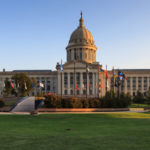 Oklahoma: Lawmakers are taking up election bills that could change who is eligible to vote in the Sooner State. Two bills, House Bill 2938 and House Bill 4113, focus on overseas voting and voting rights for felons. House Bill 2938 will tighten voting overseas under the Uniform Military and Overseas Voters Act. Under the proposed bill, people would have to prove they are a real Oklahoma resident before leaving and that they intend to return. The bill also removes a provision that allowed some voters born outside the U.S. to vote in Oklahoma elections under special circumstances. Under House Bill 4113 felons would not be eligible to vote in the Sooner State until everything tied to their sentence is completed – including time in custody, parole and probation.
Oklahoma: Lawmakers are taking up election bills that could change who is eligible to vote in the Sooner State. Two bills, House Bill 2938 and House Bill 4113, focus on overseas voting and voting rights for felons. House Bill 2938 will tighten voting overseas under the Uniform Military and Overseas Voters Act. Under the proposed bill, people would have to prove they are a real Oklahoma resident before leaving and that they intend to return. The bill also removes a provision that allowed some voters born outside the U.S. to vote in Oklahoma elections under special circumstances. Under House Bill 4113 felons would not be eligible to vote in the Sooner State until everything tied to their sentence is completed – including time in custody, parole and probation.
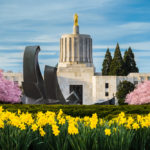 Oregon: Lawmakers heard testimony this week on Senate Bill 1530 and Senate Bill 1516, sponsored by the Senate Judiciary Committee, which would make threatening a public official, including a candidate for public office, a crime of aggravated harassment. That would be the least severe category of a felony, carrying potential sentences of up to five years in prison and a $125,000 fine. The latter piece of legislation includes the provision in a broader public safety legislative package which also empowers magistrate judges to make pretrial release decisions. Both measures specify that the person who issued threatening phone, electronic or written communications must intend to subject the official to “alarm” by conveying a threat to the public official or their family that vows to inflict serious physical injury. Although the bills would also include local prosecutors and assistant attorneys general, they would not go so far as to include other occupations who have reported rising safety concerns with their public-facing jobs, including teachers, health care workers and journalists. “This bill is designed to look specifically at school board members, city councilors, county commissioners, elected legislators and their families,” said Sen. James Manning Jr., D-Eugene. “I myself am a victim of a bomb threat. Does that mean anybody can say anything to you as an elected official, and you say, ‘Oh, that’s just free speech’? At some point, we gotta get serious about this.”
Oregon: Lawmakers heard testimony this week on Senate Bill 1530 and Senate Bill 1516, sponsored by the Senate Judiciary Committee, which would make threatening a public official, including a candidate for public office, a crime of aggravated harassment. That would be the least severe category of a felony, carrying potential sentences of up to five years in prison and a $125,000 fine. The latter piece of legislation includes the provision in a broader public safety legislative package which also empowers magistrate judges to make pretrial release decisions. Both measures specify that the person who issued threatening phone, electronic or written communications must intend to subject the official to “alarm” by conveying a threat to the public official or their family that vows to inflict serious physical injury. Although the bills would also include local prosecutors and assistant attorneys general, they would not go so far as to include other occupations who have reported rising safety concerns with their public-facing jobs, including teachers, health care workers and journalists. “This bill is designed to look specifically at school board members, city councilors, county commissioners, elected legislators and their families,” said Sen. James Manning Jr., D-Eugene. “I myself am a victim of a bomb threat. Does that mean anybody can say anything to you as an elected official, and you say, ‘Oh, that’s just free speech’? At some point, we gotta get serious about this.”
 Rhode Island: A measure to renew electronic voting provisions for disabled, military and overseas voters sailed through the Rhode Island House of Representatives last week. The 61-8 vote, with eight of 10 Republicans voting no, came without debate or questions — a stark contrast to four years ago, when lawmakers first considered online voting for specific groups facing challenges to vote by mail or in-person. The 2022 legislation letting military, overseas and disabled voters submit ballots through an electronic portal was ultimately approved and signed into law, but not before passionate debate and opposition from conservatives and progressives worried about election security. Due to the concerns, the initial law was created as a pilot program that expired Dec. 31, 2025. The 2026 bill, again sponsored in the House by Rep. William O’Brien, a North Providence Democrat, on behalf of Rhode Island Secretary of State Gregg Amore, reestablishes and makes permanent the electronic portal for the same groups. The reach of the proposal is limited — 1,871 voters used the electronic portal to submit ballots during the 2024 election, according to data from the Rhode Island Board of Elections. But for this select group of voters, its importance is critical. “If this legislation is not passed, voters who cannot see, hold, or mark a paper ballot will once again be forced to give up their right to vote independently and privately,” Graciela Pires, president of the National Federation of the Blind for Rhode Island, said in a letter to lawmakers. “This is unequal access to the ballot for voters who are blind and visually impaired. Let us not go back.”
Rhode Island: A measure to renew electronic voting provisions for disabled, military and overseas voters sailed through the Rhode Island House of Representatives last week. The 61-8 vote, with eight of 10 Republicans voting no, came without debate or questions — a stark contrast to four years ago, when lawmakers first considered online voting for specific groups facing challenges to vote by mail or in-person. The 2022 legislation letting military, overseas and disabled voters submit ballots through an electronic portal was ultimately approved and signed into law, but not before passionate debate and opposition from conservatives and progressives worried about election security. Due to the concerns, the initial law was created as a pilot program that expired Dec. 31, 2025. The 2026 bill, again sponsored in the House by Rep. William O’Brien, a North Providence Democrat, on behalf of Rhode Island Secretary of State Gregg Amore, reestablishes and makes permanent the electronic portal for the same groups. The reach of the proposal is limited — 1,871 voters used the electronic portal to submit ballots during the 2024 election, according to data from the Rhode Island Board of Elections. But for this select group of voters, its importance is critical. “If this legislation is not passed, voters who cannot see, hold, or mark a paper ballot will once again be forced to give up their right to vote independently and privately,” Graciela Pires, president of the National Federation of the Blind for Rhode Island, said in a letter to lawmakers. “This is unequal access to the ballot for voters who are blind and visually impaired. Let us not go back.”
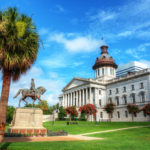 South Carolina: A bill that would put a little extra cash in poll workers’ pockets passed the House unanimously last week. Election officials cheered any help they can get in recruiting poll workers. The legislation exempts poll workers’ rather measly pay from state income taxes. Officially, it would match the federal tax code, which already exempts up to $2,300 annually of poll workers’ pay from federal income taxes. South Carolina pays poll workers $60 for several hours of mandatory, pre-election training and $75 on Election Day, for a total of $135 for what can be a 16-hour day. While precincts are open 7 a.m. to 7 p.m., poll workers must be there by 6 a.m. and stay as long as it takes for people still in line at 7 p.m. to vote, then process ballots. Some counties supplement that rate. Regardless, the piddling amount is one of the biggest barriers to finding the poll workers needed to run an election, said Isaac Cramer, director of the Charleston County elections board and president of the South Carolina Association of Registration and Election Officials. “We are trying to recruit the next generation of poll workers, and you tell them, ‘Well, you have to work a 16-hour day, and you’re only getting $135 — that doesn’t really move the needle a lot,” he said. The proposal is expected to reduce state revenue by roughly $190,000 annually, depending on the year and how many workers counties hire, according to the state Revenue and Fiscal Affairs Office. That total “shows how little they actually end up paying into state taxes,” Rep. Brandon Newton, the bill’s main sponsor, said at a committee meeting earlier this week. The bill would also mean less paperwork and a little more cash for retired teachers, police officers, and other former public employees who work the polls. They’d no longer have to pay a percentage of what they make as a poll worker into their state retirement account, saving them both money and an extra form.
South Carolina: A bill that would put a little extra cash in poll workers’ pockets passed the House unanimously last week. Election officials cheered any help they can get in recruiting poll workers. The legislation exempts poll workers’ rather measly pay from state income taxes. Officially, it would match the federal tax code, which already exempts up to $2,300 annually of poll workers’ pay from federal income taxes. South Carolina pays poll workers $60 for several hours of mandatory, pre-election training and $75 on Election Day, for a total of $135 for what can be a 16-hour day. While precincts are open 7 a.m. to 7 p.m., poll workers must be there by 6 a.m. and stay as long as it takes for people still in line at 7 p.m. to vote, then process ballots. Some counties supplement that rate. Regardless, the piddling amount is one of the biggest barriers to finding the poll workers needed to run an election, said Isaac Cramer, director of the Charleston County elections board and president of the South Carolina Association of Registration and Election Officials. “We are trying to recruit the next generation of poll workers, and you tell them, ‘Well, you have to work a 16-hour day, and you’re only getting $135 — that doesn’t really move the needle a lot,” he said. The proposal is expected to reduce state revenue by roughly $190,000 annually, depending on the year and how many workers counties hire, according to the state Revenue and Fiscal Affairs Office. That total “shows how little they actually end up paying into state taxes,” Rep. Brandon Newton, the bill’s main sponsor, said at a committee meeting earlier this week. The bill would also mean less paperwork and a little more cash for retired teachers, police officers, and other former public employees who work the polls. They’d no longer have to pay a percentage of what they make as a poll worker into their state retirement account, saving them both money and an extra form.
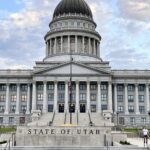 Utah: The Republican majority in the Utah House is pushing a plan for the second year in a row to require Utahns to return their by-mail ballots in person and show ID to vote. The proposal, H.B. 479, includes a fiscal note estimating over $10 million in ongoing costs to local counties, $1 million in one-time funds this year, and even more for state costs. The bill would require two poll workers to staff every drop box to check ID’s leading up to the election, along with voter outreach and materials. If passed, county clerks would mail Utahns a ballot but require that they be dropped off in person to show ID to workers, either at a drop box or a polling place. Anyone who wants to continue to return their ballot via the mail would need to apply for it via a form “designated by the Lt. Governor,” and submit it in person to their county clerk. The bill provides a list of accepted IDs beyond a driver’s license, such as a state ID, passport, Military ID, concealed carry permit, tribal ID, Bureau of Indian Affairs card, and others. It also still provides the option of voting remotely and electronically for disabled voters, and for those covered by federal voting laws. “The county Clerks are always willing to collaborate with legislators on good election-related legislation,” Weber County Clerk Ricky Hatch told ABC4 on behalf of the groups. “HB 479 places a staggering $10 million ongoing unfunded mandate directly on the counties and their taxpayers,” he said, “Significantly reducing that amount would require removing the key provisions of the bill.”
Utah: The Republican majority in the Utah House is pushing a plan for the second year in a row to require Utahns to return their by-mail ballots in person and show ID to vote. The proposal, H.B. 479, includes a fiscal note estimating over $10 million in ongoing costs to local counties, $1 million in one-time funds this year, and even more for state costs. The bill would require two poll workers to staff every drop box to check ID’s leading up to the election, along with voter outreach and materials. If passed, county clerks would mail Utahns a ballot but require that they be dropped off in person to show ID to workers, either at a drop box or a polling place. Anyone who wants to continue to return their ballot via the mail would need to apply for it via a form “designated by the Lt. Governor,” and submit it in person to their county clerk. The bill provides a list of accepted IDs beyond a driver’s license, such as a state ID, passport, Military ID, concealed carry permit, tribal ID, Bureau of Indian Affairs card, and others. It also still provides the option of voting remotely and electronically for disabled voters, and for those covered by federal voting laws. “The county Clerks are always willing to collaborate with legislators on good election-related legislation,” Weber County Clerk Ricky Hatch told ABC4 on behalf of the groups. “HB 479 places a staggering $10 million ongoing unfunded mandate directly on the counties and their taxpayers,” he said, “Significantly reducing that amount would require removing the key provisions of the bill.”
According to the Utah News Dispatch, a straightforward proposal to allow Utahns purchasing a hunting or fishing license to receive a voter registration form took an unexpected and controversial turn when it hit the House floor this week. Layton Republican Rep. Trevor Lee, the legislation’s sponsor, introduced a last-minute change so the bill now allows “the lieutenant governor or the legislative auditor general to contract with a third-party to assist in the review and identification of inaccuracies in the voter registration database.” Lee described the change as small, but it drew opposition from lawmakers of both major parties. The bill passed the House with a tight 39-32 vote and now goes to the Senate for consideration. “I appreciate what the sponsor is trying to do here, but I have huge concerns,” Sandy Democratic Rep. Andrew Stoddard told the House. “One is about the change of the tone of the bill. This bill started out initially as a very straightforward bill with no opposition to now having a very concerning part added to it with this substitute.” The bill, according to Stoddard, would allow the state government to hand over private information, like driver’s license records, vital records, among others, to an outside company. Concerns extend from the cost of that potential initiative to the potential of privacy breaches, he said. Lieutenant Governor Deidre Henderson, the state’s top election official, said Lee hadn’t worked with her office in any way.
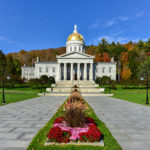 Vermont: Vermont’s lower chamber passed a bill that aims to make interference with the voting process punishable by up to 2 years in prison. The bill, H. 541, passed without need for a roll call vote. It shares some wording with a similar federal law, but that law would not apply to local or state elections – which lawmakers sought to fix. Anyone found to be “intentionally or recklessly [intimidating]” a voter, public servant, or election official would be guilty under the law. The specific mention of intimidation of officials is not in the original U.S. law. Legislators said that they originally drafted the bill because of concerns about election interference raised by Secretary of State Sarah Copeland Hanzas. “H.541 sits at the nexus of two fundamental democratic principles: the right to vote unobstructed and the right to free political speech,” said Rep. Ian Goodnow (D-Windham), one of the two original sponsors of the bill, along with Rep. Kate Nugent (D-Chittenden). Vermont currently has a $1,000 fine in place for anyone who attempts to influence a voter while at a polling place, but does not cover election interference in other places.
Vermont: Vermont’s lower chamber passed a bill that aims to make interference with the voting process punishable by up to 2 years in prison. The bill, H. 541, passed without need for a roll call vote. It shares some wording with a similar federal law, but that law would not apply to local or state elections – which lawmakers sought to fix. Anyone found to be “intentionally or recklessly [intimidating]” a voter, public servant, or election official would be guilty under the law. The specific mention of intimidation of officials is not in the original U.S. law. Legislators said that they originally drafted the bill because of concerns about election interference raised by Secretary of State Sarah Copeland Hanzas. “H.541 sits at the nexus of two fundamental democratic principles: the right to vote unobstructed and the right to free political speech,” said Rep. Ian Goodnow (D-Windham), one of the two original sponsors of the bill, along with Rep. Kate Nugent (D-Chittenden). Vermont currently has a $1,000 fine in place for anyone who attempts to influence a voter while at a polling place, but does not cover election interference in other places.
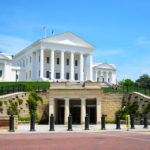 Virginia: Gov. Abigail Spanberger (D) has signed bills to set a referendum for four constitutional amendments — some of which have been years in the making, including ex-felon voting rights restoration — officially sending them to Virginians to weigh in on this year. “When Virginians have paid their debt to society, they deserve to regain their right to vote,” Spanberger said of the voting rights amendment. Presently, Virginians with felony convictions permanently lose their voting rights unless a governor restores them. Three previous governors from both parties had streamlined the approvals by tweaking certain eligibility criteria and making the process automatic, so long as a prison sentence was complete. Former Gov. Glenn Youngkin, Spanberger’s predecessor, shifted back to a petition process. With reductions in approvals, there was also little criteria to guide applicants on whether their petitions would be successful or not. Several rejected applicants told The Mercury in 2024 that they were dismayed not to be able to participate in the presidential election and their local city councils. Having already repaid the debt to society that Spanberger referenced, the rejected applicants were eager to once again engage in democracy. Virginia House Speaker Don Scott, D-Portsmouth, bore a large grin on Friday as the governor signed the bill. Aside from being the state’s first Black speaker, Scott has gone from past imprisonment for a felony conviction to public service and political leadership. He said previously he supports this amendment based on his personal experience and would like others like him to benefit from it.
Virginia: Gov. Abigail Spanberger (D) has signed bills to set a referendum for four constitutional amendments — some of which have been years in the making, including ex-felon voting rights restoration — officially sending them to Virginians to weigh in on this year. “When Virginians have paid their debt to society, they deserve to regain their right to vote,” Spanberger said of the voting rights amendment. Presently, Virginians with felony convictions permanently lose their voting rights unless a governor restores them. Three previous governors from both parties had streamlined the approvals by tweaking certain eligibility criteria and making the process automatic, so long as a prison sentence was complete. Former Gov. Glenn Youngkin, Spanberger’s predecessor, shifted back to a petition process. With reductions in approvals, there was also little criteria to guide applicants on whether their petitions would be successful or not. Several rejected applicants told The Mercury in 2024 that they were dismayed not to be able to participate in the presidential election and their local city councils. Having already repaid the debt to society that Spanberger referenced, the rejected applicants were eager to once again engage in democracy. Virginia House Speaker Don Scott, D-Portsmouth, bore a large grin on Friday as the governor signed the bill. Aside from being the state’s first Black speaker, Scott has gone from past imprisonment for a felony conviction to public service and political leadership. He said previously he supports this amendment based on his personal experience and would like others like him to benefit from it.
A Democratic House subcommittee advanced a broad slate of bills aimed at tightening how U.S. Immigration and Customs Enforcement can operate in Virginia. Lawmakers and supporters say the package of proposals is designed to protect access to courts, schools, polling places and other sensitive locations while restoring public trust shaken by recent federal immigration enforcement activity. The measures, many of which were consolidated because of overlapping goals, now head to the full House Public Safety Committee. Taken together, the bills would require judicial warrants for certain civil immigration arrests in courthouses and other public facilities, restrict immigration enforcement near polling places, limit cooperation between state and local law enforcement and federal immigration authorities, and impose new penalties on officers who conceal their identities or impersonate federal agents.
 Washington: Lawmakers want to make it tougher to challenge a voter’s registration as organized efforts to knock residents off the rolls are on the rise. The House approved legislation to put additional burdens on those challenging residents’ voter registration and to make it a crime if they knowingly provide false information in the process. Supporters of House Bill 1916, which passed on a party-line 58-38 vote, said it will reduce challenges that can intimidate voters, especially the electorate’s newest registrants. House Bill 1916 imposes additional demands to challenge a voter. For example, a person may only challenge a voter who is registered in the same county. They would now have to send a certified letter to a voter’s residential and mailing addresses, if different. They would also have to use a form provided by the Secretary of State’s Office outlining the reason for the challenge. Also, the legislation would add language requiring challenges to be “based on personal knowledge,” which is defined as “firsthand knowledge through experience or observation of the facts upon each ground that the challenge is based.” Each challenge must be signed in ink, with electronic signatures rejected. The bill creates new penalties for knowingly providing false information as part of a challenge or knowingly challenging a voter registration without reasonable cause. The bill also gives county auditors greater latitude to reject meritless challenges and it would only allow hearings if the county auditor is unable to confirm the voter’s eligibility and there is probable cause that the challenged voter is not eligible to vote.
Washington: Lawmakers want to make it tougher to challenge a voter’s registration as organized efforts to knock residents off the rolls are on the rise. The House approved legislation to put additional burdens on those challenging residents’ voter registration and to make it a crime if they knowingly provide false information in the process. Supporters of House Bill 1916, which passed on a party-line 58-38 vote, said it will reduce challenges that can intimidate voters, especially the electorate’s newest registrants. House Bill 1916 imposes additional demands to challenge a voter. For example, a person may only challenge a voter who is registered in the same county. They would now have to send a certified letter to a voter’s residential and mailing addresses, if different. They would also have to use a form provided by the Secretary of State’s Office outlining the reason for the challenge. Also, the legislation would add language requiring challenges to be “based on personal knowledge,” which is defined as “firsthand knowledge through experience or observation of the facts upon each ground that the challenge is based.” Each challenge must be signed in ink, with electronic signatures rejected. The bill creates new penalties for knowingly providing false information as part of a challenge or knowingly challenging a voter registration without reasonable cause. The bill also gives county auditors greater latitude to reject meritless challenges and it would only allow hearings if the county auditor is unable to confirm the voter’s eligibility and there is probable cause that the challenged voter is not eligible to vote.
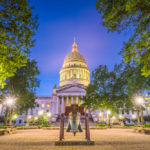 West Virginia: Delegates have passed a bill that would require that absentee ballots be received by 8 p.m. on Election Day in order to be counted. The House passed House Bill 4600 with a vote of 79 to 17 and three members absent. Under current law, absentee ballots are counted if they are postmarked by Election Day and received before the canvass, when the votes are officially counted. The Republican-led House voted down four amendments by Democrats Evan Hansen, D-Monongalia, and Sean Hornbuckle, D-Cabell, that would have kept the current deadline for students studying outside their home counties, for sick and disabled people, for the elderly and for military members. Democrats who opposed the bill have pointed out that the United States Postal Service sometimes delivers mail late and that voters do not control when the mail is delivered. They argue that the bill is based on conspiracy theories about election fraud. If House Bill 4600 becomes law, absentee ballots would need to be received by 8 p.m. on Election Day in order to be counted. A similar bill last year was among a slew of “election integrity” bills introduced in last year. Last year’s bill passed in the House last year but did not make it to a vote in the Senate in time.
West Virginia: Delegates have passed a bill that would require that absentee ballots be received by 8 p.m. on Election Day in order to be counted. The House passed House Bill 4600 with a vote of 79 to 17 and three members absent. Under current law, absentee ballots are counted if they are postmarked by Election Day and received before the canvass, when the votes are officially counted. The Republican-led House voted down four amendments by Democrats Evan Hansen, D-Monongalia, and Sean Hornbuckle, D-Cabell, that would have kept the current deadline for students studying outside their home counties, for sick and disabled people, for the elderly and for military members. Democrats who opposed the bill have pointed out that the United States Postal Service sometimes delivers mail late and that voters do not control when the mail is delivered. They argue that the bill is based on conspiracy theories about election fraud. If House Bill 4600 becomes law, absentee ballots would need to be received by 8 p.m. on Election Day in order to be counted. A similar bill last year was among a slew of “election integrity” bills introduced in last year. Last year’s bill passed in the House last year but did not make it to a vote in the Senate in time.
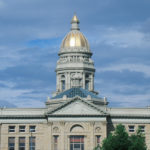 Wyoming: Lawmakers in the House shot down six election-related committee bills that would have banned ballot drop boxes, barred ballot collecting, required random ballot hand count audits, directed counties to use pen and paper ballots, expanded poll watcher access and raised the bar for independent candidates to appear on the general election ballot . The damage on the Senate side was less severe. Lawmakers killed Senate File 29, a committee bill that would have restricted acceptable identification for voting. Senate File 28, which would create stricter requirements for testing voting machines. (A couple of other election-related committee bills, Senate File 30, “Elections-voter registration revisions,” and House Bill 52, “Elections-hand counting for recounts,” also made it past the introductory hurdle.
Wyoming: Lawmakers in the House shot down six election-related committee bills that would have banned ballot drop boxes, barred ballot collecting, required random ballot hand count audits, directed counties to use pen and paper ballots, expanded poll watcher access and raised the bar for independent candidates to appear on the general election ballot . The damage on the Senate side was less severe. Lawmakers killed Senate File 29, a committee bill that would have restricted acceptable identification for voting. Senate File 28, which would create stricter requirements for testing voting machines. (A couple of other election-related committee bills, Senate File 30, “Elections-voter registration revisions,” and House Bill 52, “Elections-hand counting for recounts,” also made it past the introductory hurdle.
Legal Updates
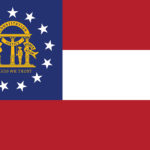 Georgia: U.S. District Court Judge J. P. Boulee ordered that documents related to the FBI’s seizure of Fulton County ballots from the 2020 presidential election be unsealed by February 10. Boulee, an appointee of President Donald Trump, issued the order in response to motions filed Wednesday by Fulton County to unseal the records related to the Jan. 28 FBI raid on an election operations center on Campbellton Fairburn Road. “We will fight using all resources against those who seek to take over our elections,” Fulton County Commission Chair Robb Pitts said last week. “Our Constitution itself is at stake in this fight.” In his order, Boulee wrote that the Justice Department did not object to unsealing the search warrant affidavit related paperwork. The judge’s order follows a week of legal action and escalating rhetoric from Trump, who has long claimed the 2020 election was “rigged” against him. CNN, The Associated Press and other media organizations on Friday filed a separate motion to intervene in the case. Media groups, including The Atlanta Journal-Constitution, have sought access to the affidavit that formed the legal justification for the criminal warrant authorizing the raid.
Georgia: U.S. District Court Judge J. P. Boulee ordered that documents related to the FBI’s seizure of Fulton County ballots from the 2020 presidential election be unsealed by February 10. Boulee, an appointee of President Donald Trump, issued the order in response to motions filed Wednesday by Fulton County to unseal the records related to the Jan. 28 FBI raid on an election operations center on Campbellton Fairburn Road. “We will fight using all resources against those who seek to take over our elections,” Fulton County Commission Chair Robb Pitts said last week. “Our Constitution itself is at stake in this fight.” In his order, Boulee wrote that the Justice Department did not object to unsealing the search warrant affidavit related paperwork. The judge’s order follows a week of legal action and escalating rhetoric from Trump, who has long claimed the 2020 election was “rigged” against him. CNN, The Associated Press and other media organizations on Friday filed a separate motion to intervene in the case. Media groups, including The Atlanta Journal-Constitution, have sought access to the affidavit that formed the legal justification for the criminal warrant authorizing the raid.
 Iowa: A settlement agreement was reached in the lawsuit challenging Iowa Secretary of State Paul Pate’s order 2024 pertaining to more than 2,000 people identified as potential noncitizens. Pate and Attorney General Brenna Bird celebrated what they called an “election integrity win,” while advocates speaking on behalf of the American Civil Liberties Union at a Wednesday news conference said the settlement provides “important safeguards” to protect Iowans’ voting rights in future elections. The lawsuit, filed by the American Civil Liberties Union, ACLU of Iowa and a law firm representing the League of United Latin American Citizens and other plaintiffs, challenged Pate’s guidance to county auditors in 2024, which challenged the ballots of voters identified as potentially not having U.S. citizenship. The settlement in the lawsuit that was brought by the ACLU, LULAC and others listed as “potential noncitizens” is not yet finalized, according to an ACLU news release. As of Wednesday afternoon, the groups and individuals who brought the lawsuit have filed papers seeking to dismiss the case and adopt the settlement agreement, but a judge has not yet entered an order on the case. However, details on the settlement were shared, which include agreements that the list used in 2024 will not be used in future elections or for future voter list challenges, removals or maintenance activities, and a requirement that future voter challenge lists within 90 days of an election will not exclusively rely on Iowa DOT data, according to the ACLU. The Secretary of State’s office stated in a news release the office can now use the SAVE database and “no longer has need of the 2024 list, which has been rescinded.”
Iowa: A settlement agreement was reached in the lawsuit challenging Iowa Secretary of State Paul Pate’s order 2024 pertaining to more than 2,000 people identified as potential noncitizens. Pate and Attorney General Brenna Bird celebrated what they called an “election integrity win,” while advocates speaking on behalf of the American Civil Liberties Union at a Wednesday news conference said the settlement provides “important safeguards” to protect Iowans’ voting rights in future elections. The lawsuit, filed by the American Civil Liberties Union, ACLU of Iowa and a law firm representing the League of United Latin American Citizens and other plaintiffs, challenged Pate’s guidance to county auditors in 2024, which challenged the ballots of voters identified as potentially not having U.S. citizenship. The settlement in the lawsuit that was brought by the ACLU, LULAC and others listed as “potential noncitizens” is not yet finalized, according to an ACLU news release. As of Wednesday afternoon, the groups and individuals who brought the lawsuit have filed papers seeking to dismiss the case and adopt the settlement agreement, but a judge has not yet entered an order on the case. However, details on the settlement were shared, which include agreements that the list used in 2024 will not be used in future elections or for future voter list challenges, removals or maintenance activities, and a requirement that future voter challenge lists within 90 days of an election will not exclusively rely on Iowa DOT data, according to the ACLU. The Secretary of State’s office stated in a news release the office can now use the SAVE database and “no longer has need of the 2024 list, which has been rescinded.”
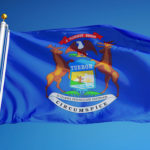 Michigan: U.S. District Court Chief Judge Hala Y. Jarbou of the Western District of Michigan has dismissed the U.S. Department of Justice’s lawsuit against Michigan over the state’s refusal to give the department an unredacted list of registered voters, finding the state isn’t required by federal law to turn it over. The department requested a copy of Michigan’s voter roll in July, along with answers to a series of questions about its voter registration practices. In September, Michigan provided a redacted version of the voter roll that withheld voters’ personally identifiable information, which the state said was necessary to avoid breaking state and federal law. The Department of Justice then sued Michigan for the complete data later that month. Jarbou wrote in her opinion that none of the three laws that the Department of Justice had used to justify its request — the Civil Rights Act of 1960, the National Voter Registration Act, and the Help America Vote Act — required the disclosure of the data.
Michigan: U.S. District Court Chief Judge Hala Y. Jarbou of the Western District of Michigan has dismissed the U.S. Department of Justice’s lawsuit against Michigan over the state’s refusal to give the department an unredacted list of registered voters, finding the state isn’t required by federal law to turn it over. The department requested a copy of Michigan’s voter roll in July, along with answers to a series of questions about its voter registration practices. In September, Michigan provided a redacted version of the voter roll that withheld voters’ personally identifiable information, which the state said was necessary to avoid breaking state and federal law. The Department of Justice then sued Michigan for the complete data later that month. Jarbou wrote in her opinion that none of the three laws that the Department of Justice had used to justify its request — the Civil Rights Act of 1960, the National Voter Registration Act, and the Help America Vote Act — required the disclosure of the data.
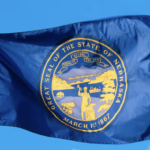 Nebraska: Lancaster County District Judge Lori Maret dismissed a lawsuit without prejudice late last week that sought to stop the state from handing over its voter data to the U.S. Department of Justice. Maret said in her Friday ruling that Common Cause lacks standing to sue because the alleged harm is speculative and not imminent, and ruling now would not end the controversy surrounding the DOJ request, including what information the Justice Department would ultimately seek or what Nebraska would provide. She also did not rule on the legal question at the heart of the lawsuit. The judge heard arguments last month. Common Cause argued that Nebraska law affords federal officials no special rights to access residents’ private information included in parts of the voter file. The state argued that federal agencies still play a valuable role in elections overseen by states, noting that the federal government has a wealth of information and resources that help states with election systems. Voting advocacy group Common Cause has appealed the ruling to the Nebraska Court of Appeals, which gave the case a docket number. Nebraska Secretary of State Bob Evnen has said he plans to hand over the voter data to the DOJ on Thursday. The Nebraska Supreme Court accelerated the appeal, but even under the court’s expedited timeline, the appeal hearing will be held in March, more than a month after Evnen plans to hand over the data to the federal government.
Nebraska: Lancaster County District Judge Lori Maret dismissed a lawsuit without prejudice late last week that sought to stop the state from handing over its voter data to the U.S. Department of Justice. Maret said in her Friday ruling that Common Cause lacks standing to sue because the alleged harm is speculative and not imminent, and ruling now would not end the controversy surrounding the DOJ request, including what information the Justice Department would ultimately seek or what Nebraska would provide. She also did not rule on the legal question at the heart of the lawsuit. The judge heard arguments last month. Common Cause argued that Nebraska law affords federal officials no special rights to access residents’ private information included in parts of the voter file. The state argued that federal agencies still play a valuable role in elections overseen by states, noting that the federal government has a wealth of information and resources that help states with election systems. Voting advocacy group Common Cause has appealed the ruling to the Nebraska Court of Appeals, which gave the case a docket number. Nebraska Secretary of State Bob Evnen has said he plans to hand over the voter data to the DOJ on Thursday. The Nebraska Supreme Court accelerated the appeal, but even under the court’s expedited timeline, the appeal hearing will be held in March, more than a month after Evnen plans to hand over the data to the federal government.
 North Carolina: U.S. District Judge William L. Osteen denied a motion for a preliminary injunction for college students seeking to have polling sites available on their campuses when early in-person voting begins this week. The state Board of Elections rejected early voting sites in January at on-campus locations at NC A&T State University, UNC-Greensboro, and Western Carolina University. College Democrats of North Carolina and students at the three campuses appealed, arguing that denying universities early voting sites was part of a targeted effort to limit young people’s opportunities to vote. The students argued in their suit that because many do not have transportation, it would be difficult to travel to the off-campus polling locations. But Osteen wrote in a Sunday opinion that in the court’s view, the solution being sought by the college students was “problematic” because it would depend on the actions of third parties beyond the court’s control. “Those universities are independent entities that are not party to this case and not subject to this court’s equitable powers,” reasoned Osteen. Further, Osteen said that it was also “speculative” to suggest that granting the motion would result in the opening of on-campus early voting sites at the three campuses in just a matter of days. “That the universities hosted early voting sites in prior elections, or that one of them indicated over a month ago that it could do so in this election, is one thing,” Osteen continued in his 14-page ruling. “Whether they are able or willing to do so now, only days away from the start of the early voting period, is another.”
North Carolina: U.S. District Judge William L. Osteen denied a motion for a preliminary injunction for college students seeking to have polling sites available on their campuses when early in-person voting begins this week. The state Board of Elections rejected early voting sites in January at on-campus locations at NC A&T State University, UNC-Greensboro, and Western Carolina University. College Democrats of North Carolina and students at the three campuses appealed, arguing that denying universities early voting sites was part of a targeted effort to limit young people’s opportunities to vote. The students argued in their suit that because many do not have transportation, it would be difficult to travel to the off-campus polling locations. But Osteen wrote in a Sunday opinion that in the court’s view, the solution being sought by the college students was “problematic” because it would depend on the actions of third parties beyond the court’s control. “Those universities are independent entities that are not party to this case and not subject to this court’s equitable powers,” reasoned Osteen. Further, Osteen said that it was also “speculative” to suggest that granting the motion would result in the opening of on-campus early voting sites at the three campuses in just a matter of days. “That the universities hosted early voting sites in prior elections, or that one of them indicated over a month ago that it could do so in this election, is one thing,” Osteen continued in his 14-page ruling. “Whether they are able or willing to do so now, only days away from the start of the early voting period, is another.”
 Pennsylvania: The Republican National Committee (RNC) petitioned the Supreme Court this week to reverse a ruling that requires Pennsylvania to count undated and misdated mail-in ballots, saying its logic transforms the courts into “weapons of political warfare.” The technical requirements for Pennsylvania mail ballots have been the subject of extensive litigation ever since the state passed universal mail voting in 2019. The RNC’s petition urges the justices to review an appeals ruling from last August, which found the state’s instruction to not count ballots that lack a proper date on the outer return envelope imposes an unconstitutional burden on Pennsylvanians’ right to vote. The RNC said the petition was filed February 11. It has not yet been posted to the court’s public docket, which often takes several days. The justices will review the RNC’s request at a closed-door meeting in the coming months. The Supreme Court only agrees to take up roughly 1 to 2 percent of the cases it receives.
Pennsylvania: The Republican National Committee (RNC) petitioned the Supreme Court this week to reverse a ruling that requires Pennsylvania to count undated and misdated mail-in ballots, saying its logic transforms the courts into “weapons of political warfare.” The technical requirements for Pennsylvania mail ballots have been the subject of extensive litigation ever since the state passed universal mail voting in 2019. The RNC’s petition urges the justices to review an appeals ruling from last August, which found the state’s instruction to not count ballots that lack a proper date on the outer return envelope imposes an unconstitutional burden on Pennsylvanians’ right to vote. The RNC said the petition was filed February 11. It has not yet been posted to the court’s public docket, which often takes several days. The justices will review the RNC’s request at a closed-door meeting in the coming months. The Supreme Court only agrees to take up roughly 1 to 2 percent of the cases it receives.
 Wisconsin: The Wisconsin Court of Appeals reversed a lower court ruling permanently banning voters from canceling an absentee ballot they have already returned so they can cast a new ballot, known as ballot spoiling. The ban was handed down in 2023by U.S. Attorney Brad Schimel, who at the time was a Waukesha County Circuit Court judge presiding over a lawsuit brought on behalf of Waukesha County voter Nancy Kormanik. The conservative voting rights group claimed in the suit that the Wisconsin Elections Commission unlawfully advised municipal clerks and the public that ballot spoiling was permitted. An appellate panel reversed Schimel’s decision in a brief, unpublished order that effectively dismisses the action entirely, finding that Schimel wrongly ruled on the merits because Kormanik failed to properly conduct service at the outset. A challenge to the validity of an administrative rule or guidance document requires the plaintiff to serve the Joint Committee for Review of Administrative Rules so that it can intervene if it so chooses.
Wisconsin: The Wisconsin Court of Appeals reversed a lower court ruling permanently banning voters from canceling an absentee ballot they have already returned so they can cast a new ballot, known as ballot spoiling. The ban was handed down in 2023by U.S. Attorney Brad Schimel, who at the time was a Waukesha County Circuit Court judge presiding over a lawsuit brought on behalf of Waukesha County voter Nancy Kormanik. The conservative voting rights group claimed in the suit that the Wisconsin Elections Commission unlawfully advised municipal clerks and the public that ballot spoiling was permitted. An appellate panel reversed Schimel’s decision in a brief, unpublished order that effectively dismisses the action entirely, finding that Schimel wrongly ruled on the merits because Kormanik failed to properly conduct service at the outset. A challenge to the validity of an administrative rule or guidance document requires the plaintiff to serve the Joint Committee for Review of Administrative Rules so that it can intervene if it so chooses.
Dane County Circuit Court Judge David Conway this week rejected the city of Madison’s claim that absentee voting’s characterization in state law as a “privilege” precludes damages against the city for disenfranchising 193 voters, and ruled that Madison can face potential financial liability for the error. In rejecting motions by the city and other defendants to dismiss the case, Conway said that a state law describing absentee voting as a privilege does not mean absentee ballots receive less constitutional protection than votes cast in person. “That right to vote,” Conway wrote, “would be a hollow protection if it did not also include the right to have one’s vote counted.” Conway also rejected former Madison Clerk Maribeth Witzel-Behl’s legal argument that there is a meaningful legal difference between intentionally not counting votes and mistakenly failing to count them due to human error. He held that state law allows for people to seek damages against election officials who “negligently deprive citizens of the right to vote.” “When an election official fails to count a valid absentee ballot, whether by negligence, recklessness, or malice, he or she deprives the absentee voter of that constitutional right,” he wrote. Conway dismissed the Madison clerk’s office from the case after arguments that it could not be sued separately from the city, but allowed the case to proceed against the city, Witzel-Behl, and Deputy Clerk Jim Verbick.
Opinions This Week
National Opinions: SAVE Act, II, III, IV, V | Nationalized elections, II, III, IV | Election fixation | Free and fair elections | Certification | Ranked choice voting | U.S. Postal Service changes | Vote by mail
Alabama: Straight-ticket voting
Alaska: Initiative process
California: Voter ID
Georgia: SAVE Act | Fulton County
Maryland: Deepfakes
Michigan: Voting system | Secretary of state race
Nevada: SAVE Act | Election administration
New Jersey: Ranked choice voting
North Carolina: Early voting sites
Ohio: Dayton DHS investigation
Tennessee: Website glitch
Texas: High school voter registration
Virginia: Ex-felon voting rights
Washington: Voter data
Wisconsin: Absentee ballots | Election administration | Democracy
Available RFP
Grant Opportunity for State Associations of Election Officials: The Bipartisan Policy Center, The Elections Group (TEG), and the Election Center’s Coalition of Election Official Leaders (CEAL) Project are making grant funding available to state associations of election officials to support projects that bolster associations’ ability to serve their members. We will prioritize projects that will expand associations’ capacity and build sustainability in the long term.
The final award amount will be determined based on project scope, readiness, and available funds. We expect to award grants between $10,000 and $100,000 but will consider proposals outside this range. The intent will be to fully fund the project in the first year and provide half funding the second year as the association builds a pathway to sustainability.
Potential projects might include contracting with an individual or an association management firm to expand staffing capacity; seed funding to launch a new training program in partnership with your state community college system or university; or technology or systems to support member services such as website development, collaboration platforms, or association management systems.
If you’re interested but unsure if this partnership is the right fit for your association, please reach out to us. You can direct any questions to Joann Bautista, jbautista@bipartisanpolicy.org.
Upcoming Events
EAC Election Audit Standards Hearing: On Wednesday, February 18, join the U.S. Election Assistance Commission (EAC) for a hearing on Election Audit Standards in the agency’s Washington, DC hearing room. During the event, election officials and audit professionals will discuss ways they are effectively using audits to boost public trust in elections. This event will be livestreamed on the EAC’s YouTube channel and held in person. When: February 18, 1:30pm Eastern. Where: Online and Washington, DC.
2026 NACo Legislative Conference: The NACo Legislative Conference brings together nearly 2,000 elected and appointed county officials to focus on federal policy issues that matter most to county governments. Attendees will experience timely, high-impact policy sessions and will interact with executive branch officials, members of Congress and their staff. When: February 21-24. Where: Washington, DC.
Election Center February Workshop: Focusing on interaction and sharing of practices selected by members to receive People’s Choice Awards, the February Workshops formalize those critical conversations that happen at conferences during meals, in the hallways, & the hotel lobby. The agenda augments the award-winning member presentations with applicable research and resources.Two CERA core courses and one renewal will be held following the workshop. When: February 25-27. Where: Jacksonville, Florida.
Michigan Association of County Clerks: The Michigan Association of County Clerks will hold its Spring Quarterly Meeting at the Shanty Creek Resorts in Bellaire. When: February 26-27. Where: Bellaire.
Alabama Association Board of Registrars: The Alabama Association Board of Registrars (AABOR) will host its spring 2026 meeting in Orange Beach. When: February 27. Where: Orange Beach.
New Jersey Association of Election Officials: The 89th Annual NJAEO Conference will be held March 2-4.
Michigan Association of Municipal Clerks: The Michigan Association of Municipal Clerks will hold its 2026 Clerks’ Institute in Mt. Pleasant. When: March 8-13 & March 15-20. Where: Mt. Pleasant.
Rhode Island Town and City Clerks Association (RITCCA): RITCCA’s Annual Conference will be held March 19 in Warwick. When: March 19. Where: Warwick.
Georgia Association of Voter Registrars and Election Officials (GAVREO): The Georgia Association of Voter Registrars and Election Officials will hold its 2026 conference at the Classics Center in Athens. When: March 22-25. Where: Athens.
Virginia Electoral Board Association (VEBA): The VEBA Annual Conference will be held March 23-25 at the Omni Homestead Resort in Hot Springs. When: March 23-25. Where: The Homestead.
Municipal Clerks and Finance Officers Association of Minnesota (MCFOA): MCFOA will hold its 2026 Annual Conference at the Heritage Center in Brooklyn Center. This year’s theme, Adventures in Clerking, honors the dedication and professionalism you bring to your communities each day. Our hope is that this conference sparks inspiration, provides practical tools, and creates meaningful opportunities to connect with colleagues from across Minnesota. When: March 24-27. Where: Brooklyn Center.
Connecticut Town Clerks Association (CTCA): The 2026 Spring CTCA conference will be held April 15-17 at Mystic Marriott in Mystic – hosted by New London County. When: April 15-17. Where: Mystic.
Election Center April Workshop: In April, the focus is on state associations and state trainings both by modeling conference formats, facilitation techniques, and potential content resources. The Coalition of Election Association Leaders (CEAL) guides state groups in their maturation process with mentorship and networking opportunities. When: April 22-24. Where: Chicago.
Kansas County Clerks and Election Officials Association: The 2026 Annual KCCEOA Conference will be April 28-May 1 at the Refinery in Garden City. When: April 28-May 1. Where: Garden City.
Job Postings This Week
electionlineWeekly publishes election administration job postings each week as a free service to our readers. To have your job listed in the newsletter, please send a copy of the job description, including a web link to mmoretti@electionline.org. Job postings must be received by 5pm on Wednesday in order to appear in the Thursday newsletter. Listings will run for three weeks or till the deadline listed in the posting.
Director of Election Information Technology, King County, Washington– King County Elections (KCE) seeks a dynamic and visionary leader to serve as our Director of Elections Information Technology (Division Director – Technology). The Director of Elections Information Technology will report to the elected Director of Elections, serve as a member of the Department’s Leadership Team, and lead and support a highly skilled team to achieve excellence in election technology, security, and administration. This role will play a key part in developing departmental goals, strategies, and initiatives, driving the adoption of new technologies within KCE, and fostering a culture of innovation and collaboration. This is a unique opportunity to inspire and empower a team, drive the adoption of new technologies within KCE, identify opportunities to bring innovation to the forefront of our operations, and significantly impact the future of election administration in one of the most populous and diverse counties in the United States. This is a hybrid position that performs work remotely and on-site. As a leadership team member, this position is expected to work on-site frequently during active elections. Salary: $166,509 – $211,060. Application: For the complete job listing and to apply, click here.
Election Operations & Workforce Manager, Charleston County, South Carolina– The Board of Voter Registration and Elections is an award-winning organization dedicated to excellence in electoral processes. Our mission is to daily serve the Charleston County voting constituency with Vigilance, Objectivity, and Transparency in a manner that promotes due diligence Excellence in all aspects of Elections Management. We are committed to continuous improvement, innovative practices, and exceptional service to our community, ensuring every voter’s voice is heard. Are you driven by a passion for democracy and civic engagement? Join the Board of Voter Registration and Elections as the Election Operations and Workforce Manager and play a critical role in delivering seamless, fair, and accessible elections. Key Responsibilities: Poll Worker Recruitment and Management; Polling Location Management; Liaison and Community Engagement; Support for Election Operations on Election Day and Early Voting; and Team Leadership. Salary: $68,140 – $89,252. Application: For the complete job listing and to apply, click here.
Election Service Manager, Arapahoe County, Colorado– The Arapahoe County government serves its communities in ways both obvious and obscure. As the beating heart of local and regional government, we’re here for our neighbors on their best days—and their worst. We share our residents’ goals of preserving our quality of life and strive to be the place we’re proud to call home. The Election Service Manager performs managerial level administrative, supervisory, and professional work in carrying out a comprehensive public facing service operation. This position specifically supervises the Election Services team, which includes voter service polling center logistics, election/ballot security, ballot processing and election systems maintenance. Salary: $77,439.18 – $123,701.24. Deadline: February 26. Application: For the complete job listing and to apply, click here.
Election Software Specialist, Printelect– Printelect is a dynamic and well-established regional election technology & services company with a proven track record in ballot printing, mail services, and a diverse portfolio of election products. With over fifty employees and one hundred twenty years of industry-leading experience, we take pride in our commitment to excellence and customer satisfaction. We partner with local governments throughout Virginia, North Carolina, South Carolina, and Georgia to provide products, services, and support for the conduct and administration of Federal, State, and local elections. Job Duties and Responsibilities: Work with our county and city official customers to translate their jurisdictional requirements and candidate data into formats used by voting equipment software. Utilize proprietary election management software, Microsoft Office, and Adobe Suite to build jurisdiction-specific databases, format paper and electronic ballots, and configure voting equipment to utilize those datasets. Provide phone and on-site support for our customers and troubleshoot any issues that arise. Communicate and cross-train with internal departments to facilitate accurate election preparation and good customer service. Develop a comprehensive understanding of all manufacturer hardware and software manuals, and be able to effectively communicate that information to team members and customers. Stay up to date on all new software updates and hardware offerings. Participate in on-site customer training and election day support. Salary: $55,000-60,000. Application: For the complete job listing and to apply, click here.
Elections & Voter Registration Director, Athens-Clark County, Georgia–The purpose of this position is to serve as the Chief Registration Officer and Election Supervisor for Athens-Clarke County, ensuring the lawful, secure, and transparent administration of all voter registration and election activities. The Director provides strategic leadership and operational oversight of election planning, voter registration, ballot preparation, election equipment, polling locations, and results certification in compliance with federal, state, and local laws. This role manages staff and budget, oversees process improvements and emergency preparedness, and maintains accurate and accessible election records. The Director serves as a key advisor and partner to the Board of Elections, collaborates with state and local stakeholders, and acts as a visible spokesperson to strengthen voter education, engagement, and public confidence in the electoral process. Salary: $99,902.00 – $119,007.00 Annually. Deadline: February 23. Application: For the complete job listing and to apply, click here.
Elections Division Manager, Washington County, Minnesota– Washington County is seeking a steady, collaborative, and resilient leader to serve as our Elections Division Manager. This role is well-suited for an experienced people manager who brings calm leadership to complex, high-pressure environments. While experience in elections is desired, it is not required; leadership in government or non-profit organizations may be transferable to satisfy what is needed in this role. We are most interested in candidates who demonstrate sound judgment, emotional steadiness, patience, and the ability to lead teams through change, ambiguity, and public scrutiny. The Elections Division Manager oversees all aspects of elections operations, ensuring compliance with statutory requirements while leading a team of full-time and temporary employees in the administration of federal, state, county, municipal, school district, and special elections. This position requires someone who can navigate long hours during peak election periods, respond professionally to misinformation or heightened public concern, and provide steady leadership as the team continues to strengthen its structure and operations. This is an opportunity for a leader who can bring structure, clarity, and trust to a critical public service function, while growing in their knowledge of the technical aspects of elections administration with support from experienced staff and state and county partners. Salary: $43.32 – $59.19 Hourly. Application: For the complete job listing and to apply, click here.
Elections Specialist, Kalamazoo County, Michigan– The purpose of this job is to assist with the implementation and enforcement of Michigan election laws. Provide information and support to elected officials, members of the public, and local clerks regarding the election process. Implement Election web-based initiatives. Provide backup assistance for the Elections Coordinator. Application: For the complete job listing and to apply, click here.
Regional Sales Director – Pacific West, Runbeck–The Regional Sales Director is responsible for leading high-value sales efforts, managing key client relationships, and driving revenue growth through strategic account development. This role requires a seasoned sales professional with a proven record of exceeding sales targets, developing new business opportunities, and nurturing long-term client partnerships. The Regional Sales Director acts as a trusted advisor to clients, aligning solutions with their business objectives while contributing to the company’s overall sales strategy and success. Territory will cover California, Nevada, Oregon, Washington, Alaska and Hawaii. Application: For the complete job listing and to apply, click here.
Sales Director, Civix Software Group– We are seeking an experienced Sales Director responsible for promoting and selling Civix software solutions to new and existing clients. This role focuses on GoElect, GoRegister and GoEthics software solutions. The Sales Director will focus on building pipeline, developing relationships and driving revenue growth in the Western Region of the US. This includes state-level agencies, election commissions and City and County government entities to drive the adoption of our market-leading technology that provides transparency and builds public trust in state and local government. Application: For the complete job listing and to apply, click here.
Senior Policy Manager, Anti-Corruption and Accountability, Common Cause– We are looking for a collaborative and strategic Senior Policy Manager, Anti-Corruption & Accountability to join our Policy team. This is an exciting opportunity to use your subject matter expertise to collaborate with teams across the country to develop and advance policies that support an accountable and transparent government. This is a full-time role reporting to the Senior Policy Director, Anti-Corruption & Accountability; this role is remote anywhere within the lower 48 United States with a strong preference for someone based in DC. We hope our new Senior Policy Manager will start in April. Salary: $97,850 – $113,300 a year. Application: For the complete job listing and to apply, click here.
Senior Policy Manager, Media and Technology, Common Cause– We are looking for a collaborative and strategic Senior Policy Manager, Media & Technology to join our Policy team. This is an exciting opportunity to use your subject matter expertise to collaborate with teams across the country to develop and advance policies at the federal- and state-level that support a sustainable media and information ecosystem, including issues at the intersection of media, technology, artificial intelligence, and democratic governance. This is a full-time role reporting to the Senior Director, Media & Technology; this role is remote anywhere within the lower 48 United States, with an expectation to travel up to 12 times per year. We hope our new Senior Policy Manager will start in April. Salary: $97,850 – $113,300 a year. Application: For the complete job listing and to apply, click here.
Training Program Manager, Charleston County, South Carolina– Democracy works best when every election runs flawlessly—and that starts with exceptional training. As Training Manager for the Board of Voter Registration and Elections, you’ll empower our poll managers and staff to deliver elections that are fair, accessible, and trusted by every voter in Charleston County. The Board of Voter Registration and Elections is an award-winning organization dedicated to excellence in electoral processes. Our mission is to daily serve the Charleston County voting constituency with Vigilance, Objectivity, and Transparency in a manner that promotes due diligence Excellence in all aspects of Elections Management. We believe that people are the foundation of successful elections. That’s why training is not just a task—it’s a core function of our mission. When our teams are prepared, voters can be confident that their voice will be heard, and their ballot counted. As Training Manager, you are not simply teaching procedures—you are building trust in the democratic process. You will design and deliver training that helps every poll manager, staff member, and Board member understand the importance of their role, perform it with confidence, and meet the highest standards of service to our voters. Salary: $68,140.00 – $82,000.00 Annually. Application: For the complete job listing and to apply, click here.
Voter Services Manager, King County, Washington–The Voter Services Manager (Elections Program Manager) provides leadership to a dynamic, highly skilled team of supervisors and staff who manage the voter records of over 1.4 million registered voters in King County. This position works closely with their team and department leadership to develop and deliver on the workgroup’s goals, priorities, and the department’s vision. The ideal candidate will articulate a compelling vision for voter services that inspires the team, emphasize collaboration, clear communication, and thoughtful problem-solving in compliance with election laws, and play a vital role in election planning and operational coordination. Salary: $138,964.18 – $176,145.84. Application: For the complete job listing and to apply, click here.
Marketplace
electionline provides no guarantees as to the quality of the items being sold and the accuracy of the information provided about the sale items in the Marketplace. Ads are provided directly by sellers and are not verified by electionline. If you have an ad for Marketplace, please email it to: mmoretti@electionline.org